Choose your language

Getting Around

Entry to Cuba: Visas & Travel Requirements
Traffic by the Capitol building, Havana
Photo: Shutterstock
Stay updated with the latest travel information for your trip to Cuba!
Embarking on a journey to Cuba? Here's your guide to the latest visa requirements and travel protocols. Whether you're coming from North America, Europe, or elsewhere, we've got you covered.
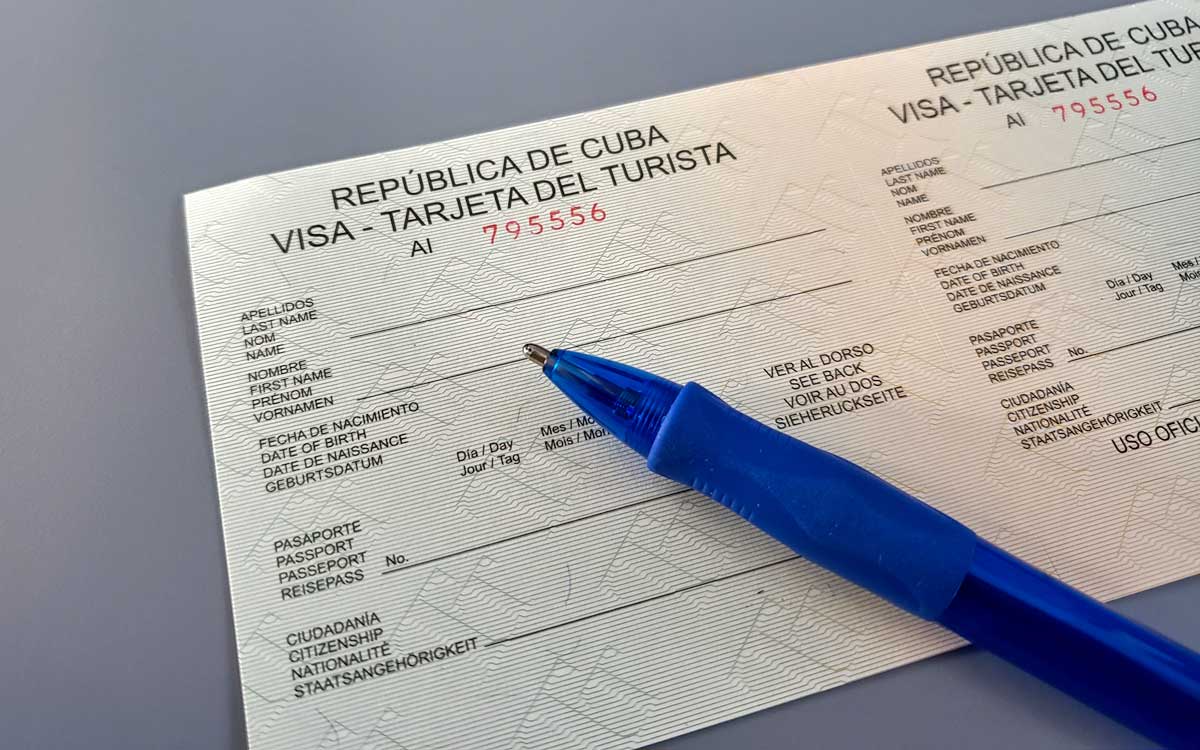
Cuba visa application form
What are the visa and entry requirements to Cuba?
US Citizens
Planning a trip to Cuba as a US citizen? There are special regulations you need to be aware of. While tourism trips to Cuba aren't yet authorized, general licenses have been issued for a variety of travel categories. If you meet the requirements of the general license under which they plan to travel, you won't need to apply for another permit from the OFAC (Office of Foreign Assets Control of the Treasury Department) for your trip.
However, it's important to note that the US Embassy in Havana and the State Department in Washington D.C do not process visa applications for trips to Cuba. If you need to apply for a visa or have any questions regarding your specific case, you should contact the Cuban Embassy in Washington D.C.
And remember, certain activities may not be allowed, so it's best to check with the US embassy for information on organizations or businesses in Cuba that U.S. citizens are not allowed to engage with due to economic sanctions or other legal restrictions.
Canadian Citizens
As a Canadian citizen, you'll need a valid passport for the duration of your stay in Cuba. Make sure your passport's expiration date isn't near to avoid any travel hiccups. Depending on your trip's purpose, you may need different types of visas. If you're traveling as a tourist, you'll need a tourist visa, which can be obtained from tour operators, airlines, or a Cuban government office in Canada.
European Citizens
If you're a European citizen planning to travel to Cuba, remember that visa protocols can vary depending on your country of residence. For most European citizens, a valid passport is required during your stay in Cuba. Some countries, like Spain, require the passport to be valid for at least 6 months.
It's also important to note that if you plan to travel to the United States after visiting Cuba, you'll need a visa. This is because the electronic system for travel authorization (ESTA) is not sufficient for those who have traveled to Cuba before. This visa must be obtained at the Consulate General of the US Embassy in your place of residence.
Given the varying requirements, it's a good idea to contact your tour operator or travel agency to understand the specific visa requirements for your travel.
Latin American Citizens
For Latin American citizens, a valid passport is required during your stay in Cuba. You'll also need to obtain a tourist visa or tourist card for your trip. This can be processed at tourism agencies or airlines, which usually handle its issuance.
The visa is generally issued for about 90 days and can then be extended. It's also important to note that you should have travel insurance with medical coverage.
Visa Costs: What to Expect
Visa costs can vary depending on where it's issued. Generally, prices range between $20 and $80. If you apply online, additional charges may apply, and prices can range from $110 to $150.
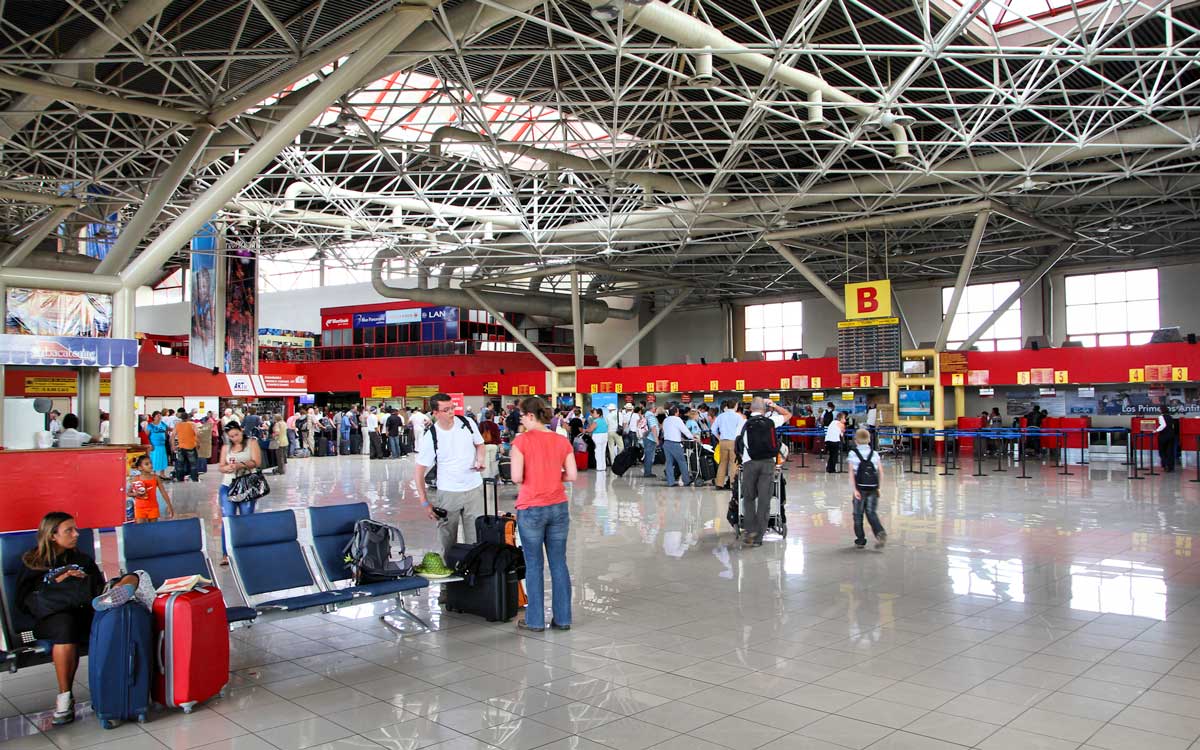
Jose Marti International Airport in Havana
What items can I bring to Cuba?
When packing for your trip to Cuba, you can bring personal effects, including personal phones and computers, free of charge. The range of objects you can bring to Cuba is quite wide, from musical instruments to televisions. However, some items may be subject to charges depending on Customs regulations.
Some items can be brought into the country without having to pay any import taxes. These include used personal objects, art and literature books, music discs, manufactured pharmaceutical products, and wheelchairs, among others.
However, it's crucial to be aware of prohibited items. While some of these, like explosives, drugs and narcotics, and blood derivatives, may seem obvious, others might surprise you. For instance, literature, articles or objects that are considered obscene, pornographic or that attack the general interests of the nation are also prohibited.
If you attempt to bring into the country articles that are not allowed for import, the General Customs of Cuba can exercise administrative sanctions. This means that Customs can seize those imported articles whose entry is prohibited in Cuba, as well as products that have been entered with a fraudulent declaration.
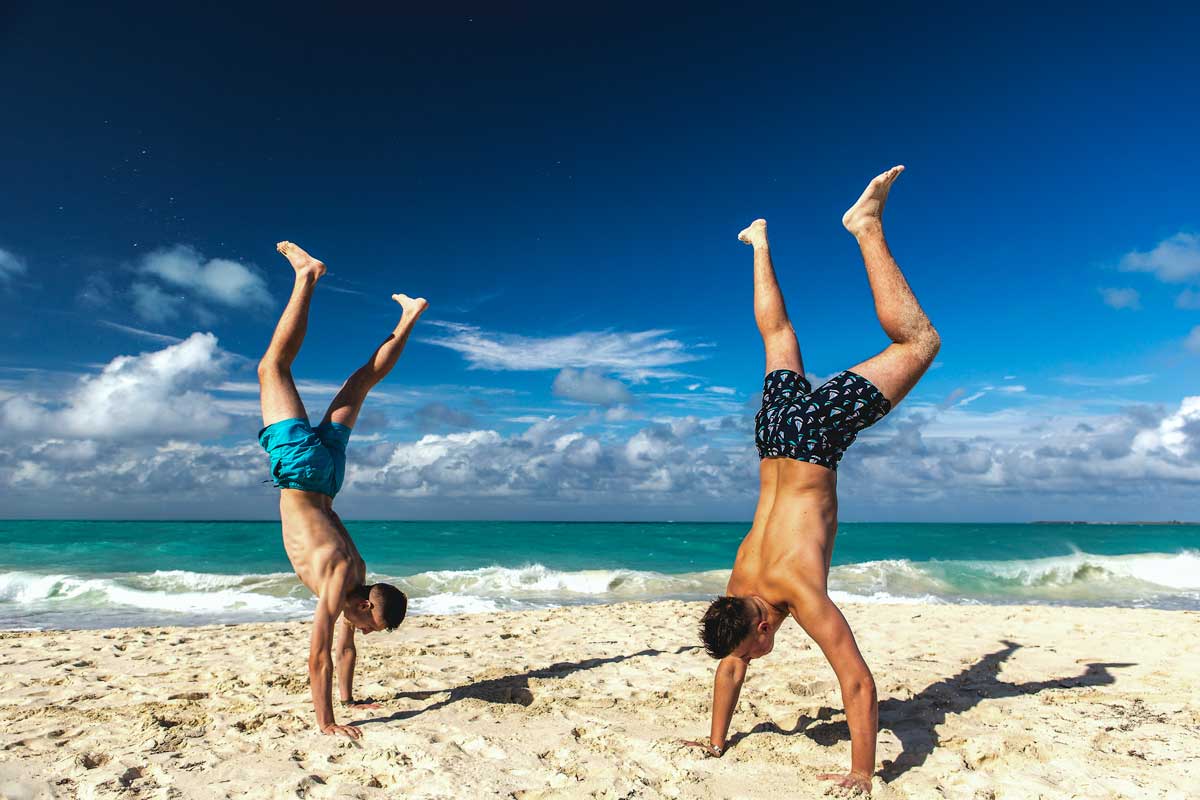
Travelers on a beach in Varadero
Photo: Unsplash
Health and Vaccinations
Before you embark on your journey to Cuba, it's important to ensure you're up to date with routine vaccines. This includes vaccines against chickenpox, tetanus, influenza, rubella, and polio. In the current climate, being vaccinated against COVID-19 is also essential.
Additionally, consider getting vaccinated against Hepatitis A and Hepatitis B. If your trip to Cuba includes exploring nature or venturing into rural areas away from the city center for activities such as outdoor camping, the rabies vaccine is also recommended. Travelers are also advised to consider the typhus vaccine.
Can I bring my pet to Cuba?
If you're planning to bring your pet to Cuba, there are a few requirements you need to meet. Make sure your pet has the necessary vaccines and an official health certificate. You'll also need to request a travel certificate for your pet from the Consulate or Embassy of Cuba in your country.
Written by Teresita Padrón .
Published July 2023.
Explore Top Destinations in Cuba
Sip and dance your way through trinidad’s nightlife.
Things To DoSip and Dance Your Way Through Trinidad's Nightlife
Five Cuban Clothing Brands to Shop for in Havana
Take a look at the emerging Cuban dress wear brands
Fábrica de Arte Cubano: A Unique Experience for Art Lovers
Havana houses one of Time Magazine’s Best 100 experiences: the
Where to Drink in Havana: Our Essential List of the Best Bars
Explore our essential list of the best bars in Cuba,
The Landscape of Cuba: Topes de Collantes
Enter and Explore Topes de Collantes. Home to amazing waterfalls
Trace the Steps of Hemingway Around Havana
Stroll through Cuba’s storied streets with this guide to Ernest
Greatest Waterfalls in Cuba
Let the crystalline waters of the greatest waterfalls in Cuba
Cayo Coco: The Ideal Cuban Paradise
Of all the Cuban islands, Cayo Coco has some of
See Cuban Nature Up-close at Sierra Del Rosario
Reconnect with nature at Cuba's Sierra del Rosario nature reserve.
Five of the Best Beaches in Cuba
Discover the best Cuban beaches making a splash in the
Subscribe to our newsletter
Get more travel inspiration, tips and exclusive offers sent straight to your inbox
I would like to get Visit Cuba newsletters in my inbox
Paradise for Your Inbox

We’re sorry, this site is currently experiencing technical difficulties. Please try again in a few moments. Exception: request blocked

Cuba Visas: Cuba Tourist Visa Guide, From A Pro [2024]
Planning on traveling to Cuba? It’s important to know that almost every visitor to Cuba needs a Cuba tourist visa or a Cuban tourist card , which must be obtained prior to arrival on the island. But how to get it?
As a long-time Cuba visitor turned expat, I’ve navigated the Cuban visa process many times – certainly, more times than I would have liked to! Read on for all the details on the easiest (and cheapest) ways to get your Cuban tourist visa – plus the travelers who need an even more specialized visa to Cuba.
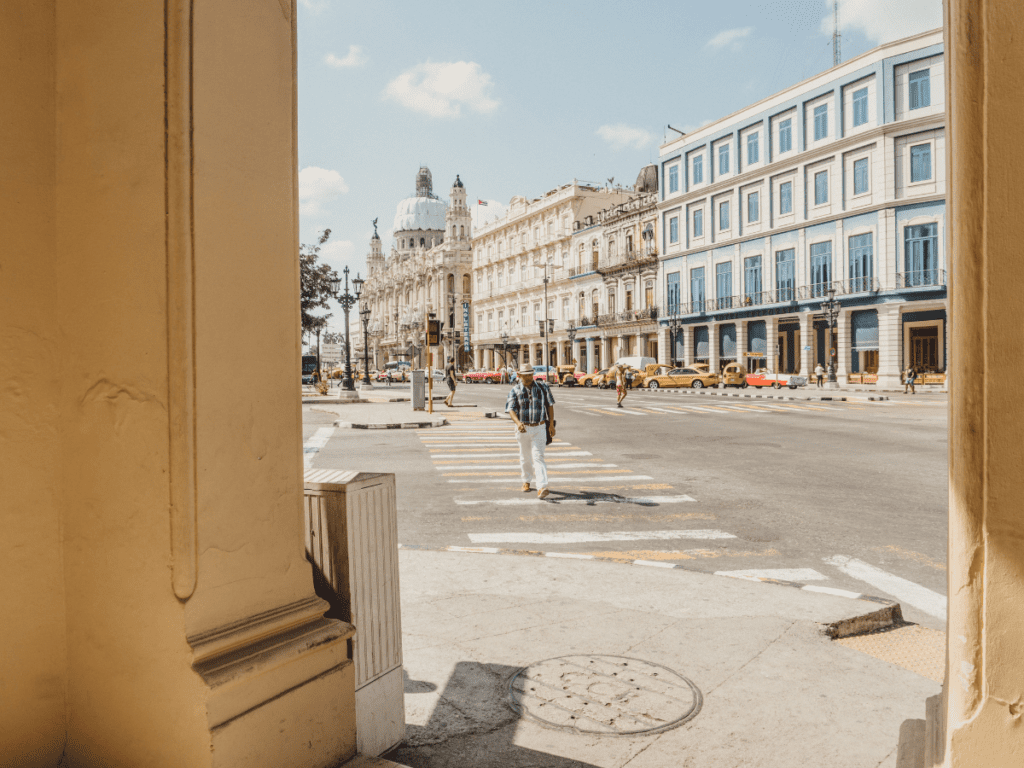
This post contains affiliate links that may reward me monetarily or otherwise when you use them to make qualifying purchases – at no cost to you. As an Amazon Associate, I earn from qualifying purchases. For more information, please read our disclosure policy .
Almost every traveler to Cuba will need to have a Cuban tourist visa when they arrive in the country. Also known as a Cuban tourist card or Cuba travel card , the Cuba tourist visa is something that every non-Cuban traveler will need to present this tourist visa at immigration when entering and exiting Cuba. This is one of the most crucial entry requirements for Cuba .
Only Cuban citizens and travelers with other types of Cuban visas (like student visas, business visas, or permanent residency) will not need to present a Cuban tourist visa upon arrival in Cuba.
Get Your Cuba Visa Online: EasyTouristVisa
Cuba Entry Requirements
A tourist visa to Cuba is one of the entry requirements for visiting the country, but only a very limited few will need to apply for a Cuban visa with their Cuban embassy in advance . Most travelers simply need to purchase their Cuban tourist visas before arriving in Cuba.
Those who must apply for a tourist visa in advance are from a select few Asian and African countries – that list can be found here . Check out this account from an Indian blogger about special requirements and procedures for the Cuba visa requirements for Indian citizens .
Most travelers to Cuba simply need to book their arline tickets to Cuba and purchase their Cuban tourist visa before arriving in Cuba, whether from an online visa service (we have used and recommend EasyTouristVisa !) or directly from their airline.
Guide to Entry Requirements to Cuba
- Entry Requirements to Cuba: The Ultimate Guide
- Cuba’s D’Viajeros Travel Form: A Guide for Travelers
- Travel Insurance to Cuba: Policy Requirements for Entry
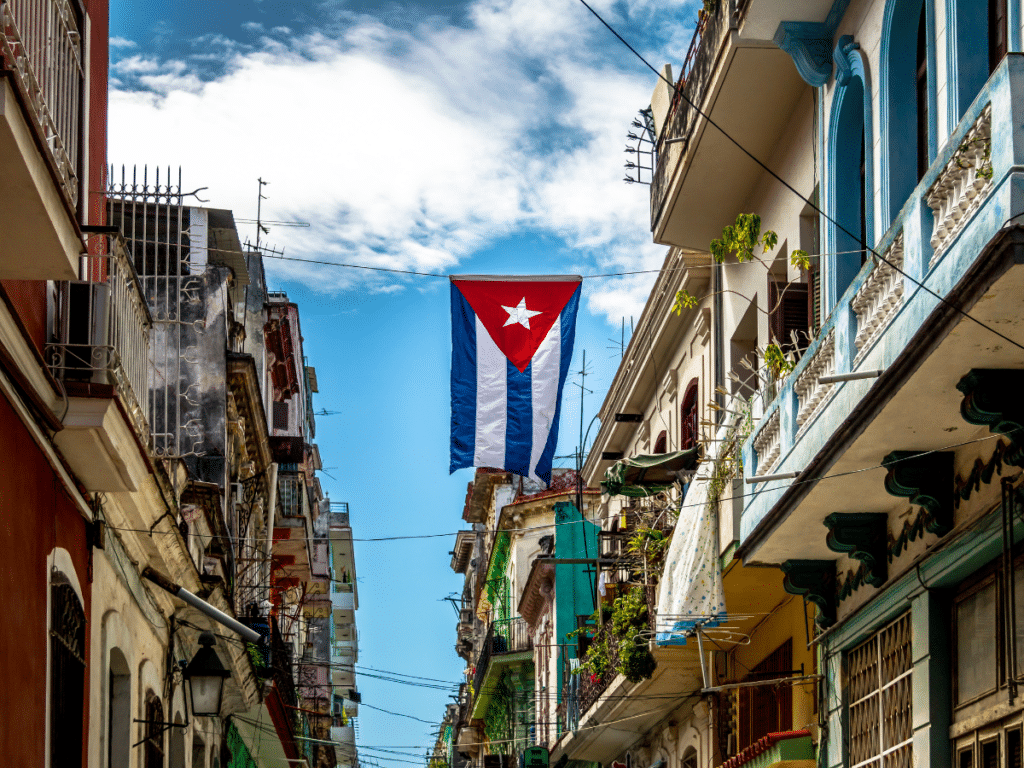
Cuban Tourist Visa
Cuban tourist visas are required for most travelers to Cuba who are not Cuban citizens or don’t have another visa status in Cuba (a student visa, permanent residency, etc). Thankfully, visas to travel to Cuba are very easy to get . Most travelers to Cuba get their Cuba visa before they travel, either online through the EasyTouristVisa website or from their airline, if possible.
Since there is no option for a Cuba visa on arrival, you’ll have to get your visa before you land in the country.
Types of Cuban Tourist Visas
Pink tourist visas.
Pink tourist visas are required for travelers arriving in Cuba on a flight from the United States (regardless of whether the traveler is a citizen of the United States or another country). Pink tourist visas generally cost between $50-110 .
Green Tourist Visas
Green tourist visas are for travelers arriving in Cuba from any country other than the United States. These green tourist visas generally cost between $20-50.
How Much Does a Cuba Tourist Visa Cost
The Cuban tourist visa does not have one fixed price – it varies depending on how and where you get it. The cost of a Cuban tourist visa also varies based on which type of tourist visa for Cuban you’ll need – either a pink tourist visa or a green tourist visa.
If ordering your visa online from EasyTouristVisa , make sure you select the correct visa type – either pink or green – depending on where you’ll be traveling from. Prompts on the website will guide you to make the right choice if you have any questions.
If you will be purchasing your tourist visa from your airline prior to departure, they’ll be prepared to offer you the visa color you’ll need.
Cuba Travel 101
- Currency in Cuba: A Local’s Guide for Travelers
- How to Get Wifi in Cuba [Updated!]
- Is Cuba Safe? Updated Cuba Safety Guide
- Ultimate Cuba Travel Guide – A Local’s Advice for Travelers
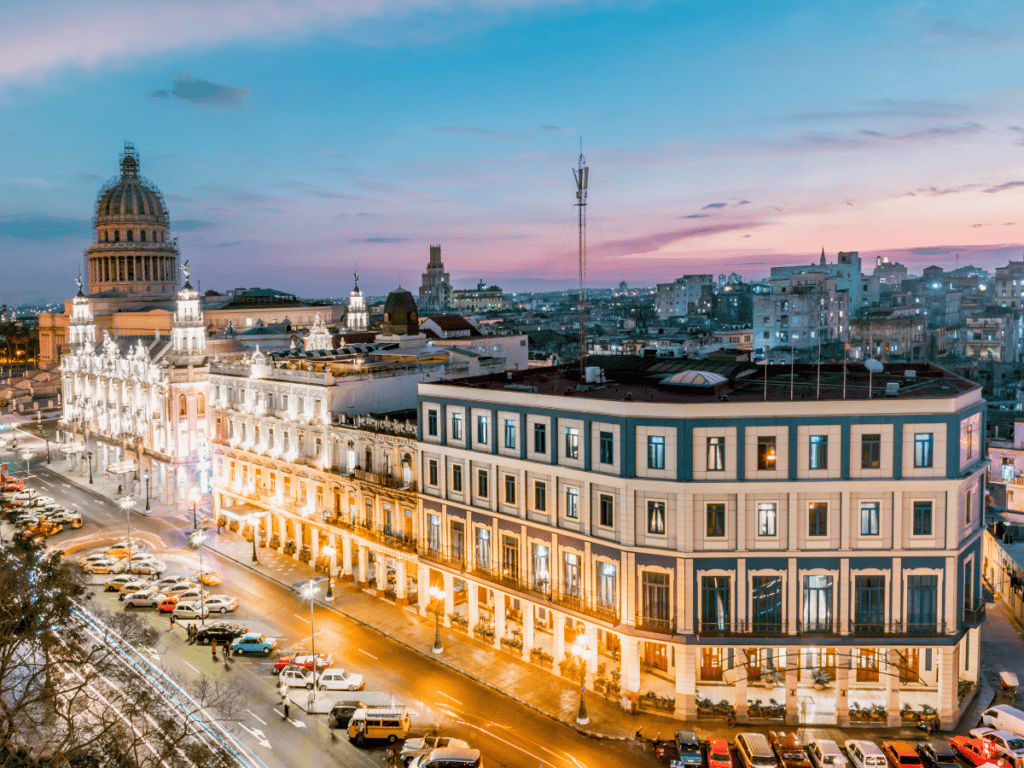
How To Get a Cuban Visa
There are several ways to get the Cuban tourist visa card required before you arrive in Cuba – some more challenging than others. You can get yours one of three ways:
- Get your Cuba visa online from the EasyTouristVisa website
- Get your Cuban visa from your airline
- Get a Cuban embassy visa
Cuba Visa Online
Cuba does not currently offer an online “e-visa” version of the tourist visa. You must have an official, physical tourist visa that you will present in immigration when arriving in the country.
However, you can obtain the Cuban visa online before your trip and have it sent to your home before you travel. I recommend looking into EasyTouristVisa as the most convenient way to get your tourist visa!
Cuba Visa from Airlines
Another way to get a Cuban tourist visa card is directly from the airline that will take you to Cuba. Each airline is responsible for making sure its travelers have a tourist visa before boarding a flight to Cuba, so they’ll generally offer the Cuban tourist visa for sale.
Most airlines offer these tourist visas for sale through their website after booking, and others may offer them prior to boarding the plane.
- American Airlines: The Cuban tourist visa from American Airlines costs $85 if purchased online through the airline prior to your flight or $125 if purchased at the airport during check-in or at your departure gate.
- Delta : The Cuban tourist visa from Delta costs $85 and can be purchased during check-in or at your departure gate.
- Copa Airlines: The Cuban tourist visa from Copa Airlines costs either $20 or $30, depending on your departure airport.
- Air Canada: Air Canada is an airline that includes the cost of the Cuba visa in the price of its ticket. Tourist cards are distributed to passengers in-flight, along with the customs and immigration forms you’ll need when you arrive in Cuba.
Cuba Visa From A Cuban Embassy
A final way to secure your Cuban tourist visa prior to traveling to Cuba is through your nearest Cuban embassy. Visit the website of the Cuban embassy in your country of origin to determine how to apply for a Cuban tourist visa from your embassy.
Generally, I don’t recommend this method of obtaining a Cuban tourist visa. This tends to be a more challenging and time-consuming way to go about what is a straightforward and simple process with EasyTouristVisa or through your airline.
Remember, it’s only required that you pre-apply for a Cuban tourist visa through an embassy if you’re from a small list of Asian and African countries . If you aren’t from one of these countries you’re free to purchase your tourist visa card online or through your airline.
What to Pack for Cuba
Check out our Ultimate Cuba Packing List to help you pack for your trip – we’re sharing exactly what to bring to Cuba and what we never travel without.
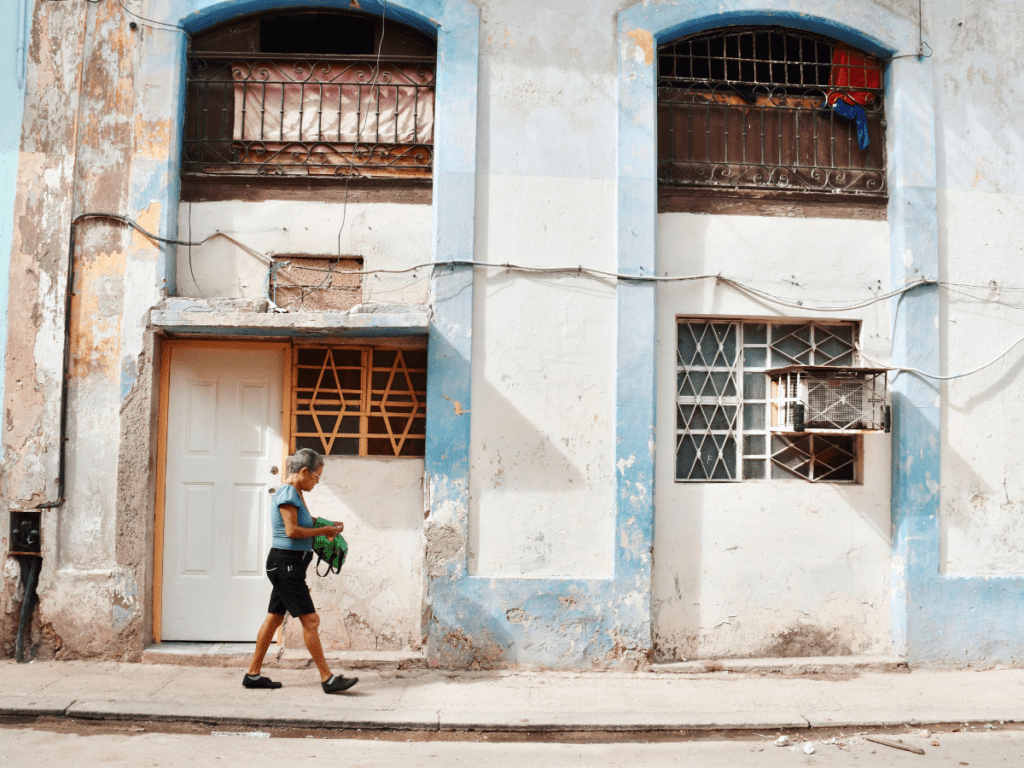
Cuba Visas – FAQ
Do americans need a visa for cuba.
Yes! Citizens of the United States need a tourist visa for Cuba. The government of Cuba requires that ALL non-Cuban visitors to the island have a tourist visa – also known as a tourist card – before arriving. There is no special Cuba visa for Americans; everyone needs the same tourist visa!
Special regulations restricting the travel of citizens of the United States to Cuba come from the government of the United States, not the government of Cuba. In the eyes of the government of Cuba, travelers from the United States are the same as travelers from any other country.
Guides for American Travelers to Cuba
- Can Americans Travel to Cuba?
- Support for the Cuban People Travel: Legal Cuba Travel for Americans
- Best Activ ities for Legal Travel to Cuba
What is the Difference Between a Tourist Visa and a Tourist Card?
What is the difference between the Cuban tourist visa and the Cuban tourist card? There is none – many people refer to the Cuban tourist visa as the Cuban tourist card , or even the Cuban travel card. Confusingly, these different phrases all refer to the same document.
The tourist visa to Cuba and the “Cuban tourist card” are the same thing – no need to worry about the use of multiple different names to describe the same document. One will suffice.
Read More: What is A Tourist Card for Cuba?

Carley Rojas Avila
Carley Rojas Avila is a bilingual travel writer, editor, content marketer, and the founder of the digital travel publications Home to Havana and Explorers Away. She is a serial expat and traveler, having visited 40+ countries and counting. Carley has written for publications like Travel + Leisure, MSN, Associated Press, Weather Channel, Wealth of Geeks, and more. Find her front row at a Bad Bunny concert, befriending street cats, and taste-testing every pizza in Havana.
Situation in Haiti April 5, 2024
U.s. citizens in haiti, update january 10, 2024, information for u.s. citizens in the middle east.
- Travel Advisories |
- Contact Us |
- MyTravelGov |
Find U.S. Embassies & Consulates
Travel.state.gov, congressional liaison, special issuance agency, u.s. passports, international travel, intercountry adoption, international parental child abduction, records and authentications, popular links, travel advisories, mytravelgov, stay connected, legal resources, legal information, info for u.s. law enforcement, replace or certify documents.
Before You Go
Learn About Your Destination
While Abroad
Emergencies
Share this page:
Travel Advisory January 5, 2024
Cuba - level 2: exercise increased caution.
Reissued with updates to crime information.
Exercise increased caution in Cuba due to crime .
Country Summary: Petty crime is a threat for tourists in Cuba. Also, violent crime, including armed robbery and homicide, sometimes occurs in Cuba.
Travel outside of the Havana area for U.S. Embassy employees requires a special notification process which may affect the Embassy’s ability to provide emergency assistance to U.S. citizens in Cuba.
Read the country information page for additional information on travel to Cuba.
If you decide to travel to Cuba:
- Be aware of your surroundings.
- Do not physically resist any robbery attempt.
- Do not display signs of wealth, such as wearing expensive watches or jewelry.
- Enroll in the Smart Traveler Enrollment Program (STEP) to receive Alerts and make it easier to locate you in an emergency.
U.S. citizens should always exercise caution when traveling abroad:
- Follow the Department of State on Facebook and Twitter .
- Review the Country Security Report for Cuba.
- Prepare a contingency plan for emergency situations. Review the Traveler’s Checklist .
Embassy Messages
View Alerts and Messages Archive
Quick Facts
Must have six months validity at the time of entry.
Two pages are required for entry/exit stamps.
Yes. Travel to Cuba for tourist activities remains prohibited by statute. See 31 C.F.R 515.560 and OFAC's Frequently Asked Questions .
None. See CDC for recommendations.
U.S. credit and debit cards do not work in Cuba. You should bring U.S. dollars or Euros to Cuba and exchange them for Cuban Pesos (CUP) at authorized banks, CADECA offices, airports or hotels. Travelers should confirm alternative payment options before traveling, as policies concerning the use of U.S. dollars in Cuba are subject to change. The Cuban government requires that travelers declare cash amounts over the equivalent of 5,000 USD.
When departing Cuba, we advise U.S. travelers to spend or exchange CUP to a foreign currency well before reaching airport security checkpoints. Currency exchange houses in the departure area at airports are currently closed and Cuban pesos are not internationally convertible outside of Cuba.. International airlines flying to the United States include departure fees and taxes in the price of airline tickets. U.S. dollars are not accepted for payment of any additional products purchased at the airport. Under Cuban law, travelers may export up to the equivalent of 5,000 USD out of the country. Anyone wishing to depart Cuba with more than this amount of cash must demonstrate evidence that the currency was acquired legitimately from a Cuban bank.
Embassies and Consulates
U.S. Embassy Calzada between L and M Streets, Vedado, Havana, Cuba Telephone: + (53) (7) 839-4100 (Monday- Friday 0830-1630, except holidays) Emergency after-hours telephone: + (53) (7) 839-4100 and dial 1 to speak with the emergency operator Fax: + (53) (7) 839-4247 Website: https:cu.usembassy.gov
Email: [email protected] (for concerns with U.S. citizens)
Destination Description
Learn about the U.S. relationship to countries around the world.
Entry, Exit and Visa Requirements
Travel to Cuba from or transiting through the United States by persons under U.S. jurisdiction (defined as [BE1] U.S. citizens located anywhere, and anyone located in the United States regardless of citizenship and nationality) , is regulated by the Office of Foreign Assets Control (OFAC) of the U.S. Department of the Treasury. All travelers falling under U.S. jurisdiction must comply with these regulations. Individuals seeking to travel to Cuba are not required to obtain licenses from OFAC if their travel is covered under the 12 travel categories authorized by a general OFAC license. If travel is not covered by a general license, you must seek OFAC authorization in the form of a specific license . Travelers who fail to comply with regulations may face penalties and criminal prosecution. For travel-specific questions, please see 31 C.F.R. 515.560 and OFAC’s Frequently Asked Questions .
Visit the Embassy of Cuba website for the most current visa information.
Cuba requires visitors to have non-U.S. medical insurance, which is usually included in airline ticket prices on flights originating in the United States. If you do not have insurance, it can be purchased upon arrival to Cuba at an airport kiosk. Asistur Medical Insurance is the official company that airlines contract. Please confirm your coverage with your airline prior to arrival in Cuba and seek additional medical insurance if needed.
Cuba does not recognize the U.S. citizenship of Cuban-born U.S. citizens who maintain residency status in Cuba. The Cuban government requires Cuban dual nationals to enter and depart Cuba using Cuban passports. Cuban-born U.S. citizens who maintain their residency status in Cuba will be treated as Cuban citizens and may be subject to Cuban restrictions and legal obligations.
Some HIV/AIDS entry restrictions exist for visitors to and foreign residents of Cuba. Foreign students on scholarships are required to test for HIV/AIDS. Please verify this information with the Embassy of Cuba before you travel.
Information about dual nationality , the prevention of international child abduction , and customs regulations can be found on our websites.
Cuban Requirements for Authorized Travelers: Attempts to enter or exit Cuba illegally, or to aid the irregular exit of Cuban nationals or other persons, are prohibited. Entering Cuban territory, territorial waters, or airspace without prior authorization from the Cuban government may result in arrest. Immigration violators are subject to prison terms ranging from four to thirty years.
Temporary Sojourn License: Most aircraft and maritime vessels on temporary sojourn to Cuba are no longer eligible for an Aircraft, Vessels, and Spacecraft (AVS) License Exception. See 15 C.F.R. § 740.15. If you are planning to enter Cuba with a U.S. or foreign-registered aircraft or maritime vessel on temporary sojourn, you must meet the criteria set forth in 15 C.F.R. § 740.15. Please see the U.S. Department of Commerce’s Bureau of Industry and Security website for additional information.
In addition, a vessel of the United States, as defined in 33 C.F.R. §107.200, may not enter Cuban territorial waters without advance permission from the U.S. Coast Guard. The U.S. Coast Guard provides permission information at (305) 415-6920.
Safety and Security
The security environment in Cuba is relatively stable and characterized by a strong military and police presence. Demonstrations are infrequent but can draw violent responses from government forces. Even demonstrations intended to be peaceful can turn confrontational without warning. Avoid demonstrations and maintain security awareness at all times. Demonstration Alerts are posted on the Embassy’s website . Review the Cuba Travel Advisory .
The Cuban government has detained U.S. citizens suspected of engaging in activities perceived to undermine state security. The Cuban government may detain individuals for activities that would not be considered criminal or offensive in the United States.
Crime: With the recent influx of travelers, there has been an increase in the number of property crimes. Crimes of opportunity, such as pick pocketing, purse snatchings, and car break-ins, are on the rise. Exercise vigilance everywhere . Do not display large amounts of cash. Do not leave your valuables unattended. Carry money in your front pockets, hold your purse and cellular phone securely and be mindful of purses or bags when dining out.
- Do not leave a beverage unattended or accept beverages from persons unknown to you.
- Locations such as Habana Vieja, Playas del Este, Varadero, and other attractions tend to have a higher incidence of property crime than other parts of Cuba.
- Be wary of misdirection schemes where someone attempts to gain your attention while another comes from behind to steal your purse, wallet, or other valuable items.
- If confronted by criminals, do not resist, try to remain calm, clearly display your hands and do not make any sudden moves that could be interpreted as resistance.
- Carry a cell phone with Cuban cellular service for emergency communications and travel in groups if possible.
- Be aware of your surroundings, especially at night or when traveling in an unfamiliar area.
- While in your car, place valuables out of sight or in a locked trunk. When unattended, avoid leaving items in the car, especially on the seat or in plain view.
- Only use marked taxis.
- Carry a copy of your passport and secure the original.
- Beware of scam artists, who may speak English and appear friendly.
- When exchanging currency, use the state-run offices known as CADECAs or official banks.
International Financial Scams: See the Department of State and the FBI pages for information.
Victims of Crime: We strongly urge U.S. citizen victims of sexual assault to contact the U.S. Embassy for assistance. Report crimes to the local police by dialing 106 and contact the U.S. Embassy at +53 7839-4100. Remember that local authorities are responsible for investigating and prosecuting crimes.
See our webpage on help for U.S. victims of crime overseas .
We can:
- help you find medical care
- assist you in reporting a crime to the police
- contact relatives or friends with your written consent
- provide general information regarding the victim’s role during the local investigation and following its conclusion
- provide a list of local attorneys
- provide information on victim’s compensation programs in the U.S.
- provide an emergency loan for repatriation to the United States and/or limited medical support in cases of destitution
- help you find accommodation and arrange flights home
- replace a stolen or lost passport
Domestic Violence: U.S. citizen victims of domestic violence are strongly encouraged to contact the Embassy for assistance.
Tourism: The tourism industry is unevenly regulated, and safety inspections for equipment and facilities do not commonly occur. Hazardous areas/activities are not always identified with appropriate signage, and staff may not be trained or certified either by the host government or by recognized authorities in the field. In the event of an injury, even basic medical treatment is typically available only in/near major cities. First responders are generally unable to access areas outside of major cities and to provide urgent medical treatment. U.S. citizens should maintain health insurance in Cuba. If stays exceed 30 days, [CM1] U.S. citizens should purchase medical insurance when they process their visa extensions.
Local Laws & Special Circumstances
Criminal Penalties: You are subject to local laws. If you violate local laws, even unknowingly, you may be expelled, arrested, or imprisoned. Individuals establishing a business or practicing a profession that requires additional permits or licensing should seek information from the competent local authorities, prior to practicing or operating a business.
Furthermore, some laws are also prosecutable in the United States, regardless of local law. For examples, see our website on crimes against minors abroad and the Department of Justice website.
Arrest Notification: If you are arrested or detained, ask police or prison officials to notify the U.S. Embassy immediately. See our webpage for further information.
Cuban penalties for the following are particularly severe:
- Possession, use, or trafficking of illegal drugs.
- Suspicion of assisting Cubans to leave the country illegally.
- Drivers involved in accidents that result in injury or death, regardless of fault.
- Importing weapons or ammunition.
- Photographing military or police installations or personnel, or harbor, rail, or airport facilities.
- Crimes against minors.
The Government of Cuba does not recognize the U.S. citizenship of Cuban-born U.S. citizens who maintain residency in Cuba and may not allow U.S. consular access to Cuban-American prisoners.
Telecommunications: Many U.S. mobile service carriers provide roaming services in Cuba. Your U.S. mobile phone will work in Cuba if your mobile phone is capable of roaming in Cuba and your mobile service provider has an international roaming agreement with ETECSA, Cuba's state-owned telecommunications provider. Currently AT&T, Sprint, Verizon, and T-Mobile have roaming agreements with ETECSA. Wi-Fi is often slow and unreliable. Be sure to confirm your carrier’s coverage before traveling.
SIM cards with a data plan can be purchased at Havana-José Martí International Airport (HAV) and local ETESCA telecommunications offices. To ensure family and friends can reach you in Cuba, check with your mobile provider about roaming options and cost or purchase a Cuban SIM card. See the FCC Travel FAQs for more information.
Cuba-related Travel Transactions: Only persons whose travel falls into the 12 OFAC approved travel categories or who have received a specific license from OFAC are authorized by the U.S. Department of the Treasury to travel to, from, or within Cuba. Direct financial transactions with certain entities and sub-entities under the control of, or acting for or on behalf of, the Cuban military, intelligence, or security services are also generally prohibited. For more information see the Department of State’s Cuba Restricted List . Additionally, lodging, paying for lodging, or making reservations on behalf of others to lodge, at certain accommodations in Cuba are prohibited; for a full list of such accommodations, see the Cuba Prohibited Accommodations List . For more information about licenses, visit OFAC’s Cuba Sanctions website . Additionally, lodging, paying for lodging, or making reservations on behalf of others to lodge, at certain accommodations in Cuba are prohibited; for a full list of such accommodations, see the Cuba Prohibited Accommodations List . For more information about licenses, visit OFAC’s Cuba Sanctions website .
Licenses for Remittances: In June 2022, OFAC published updated Cuba-related regulations . The new regulations eliminated a cap on remittances to family members in Cuba, and authorized remittances to non-family recipients as well. Certain Prohibited Officials of the Government of Cuba , Prohibited Members of the Cuban Communist Party , and the close relatives of these two groups, are not eligible to receive remittances. For information on remittance authorizations, see OFAC’s Cuba Sanctions website .
What May Be Brought Back From Cuba: Importation of Cuban merchandise for commercial purposes is restricted, with very limited exceptions. Certain imports of goods produced by independent Cuban entrepreneurs are authorized, as set forth on the Department of State’s Section 515.582 List (see 31 C.F.R 515.582). There are no limits on the import or export of informational materials. For more information related to imports, including merchandise entering the United States for personal use as accompanied baggage, please see the CBP Public Notice .
Cuban law requires foreigners to obtain authorization to remove souvenir paintings and sculptures out of Cuba. Most authorized points of sale, such as galleries and art studios, should be familiar with this process and should provide the proper documentation at the time of purchase. You can also apply for an export permit via the Cuban Fund of Cultural Assets. Travelers without a valid export permit may have their items confiscated at the port of departure. The U.S. Embassy cannot assist in these cases. For more information, please contact the embassy of Cuba .
Travelers may purchase alcohol and tobacco products while in Cuba for personal consumption in Cuba, but may not enter the United States with alcohol and/or tobacco products acquired in Cuba. Persons subject to United States jurisdiction may purchase or acquire Cuban-origin merchandise for personal consumption, including alcohol and tobacco products, while in a third country, but may not import such products into the United States. For a complete description of what this general license authorizes and the restrictions that apply, see 31 CFR § 515.585(c) and (d).
Storm Season: Tropical storms and hurricanes between May and November can produce heavy winds and rain. See our page on disaster and crisis preparedness for more information.
Faith-Based Travelers: See the following webpages for details:
- Faith-Based Travel Information
- International Religious Freedom Report – see country reports
- Human Rights Report – see country reports
- Best Practices for Volunteering Abroad
LGBTI Travelers: There are no legal restrictions on same-sex sexual relations or the organization of LGBTI events in Cuba, and on September 26, 2022 Cubans passed the referendum legalizing same sex marriage.
See our LGBTI Travel Information page and section 6 of our Human Rights report for further details.
Travelers Who Require Accessibility Assistance . Individuals with mobility issues are likely to find accessibility difficult . Few facilities or services are available, and information is limited. Most roads and sidewalks are poorly maintained.
Students: See our Students Abroad page and FBI travel tips .
Women Travelers: See our travel tips for Women Travelers .
Currency Restrictions: Be advised that policies concerning the use and convertibility of U.S. dollars in Cuba are subject to change. Obtaining U.S. dollar cash is nearly impossible through official channels. The Cuban Central Bank prohibits certain U.S. dollar cash transactions, including conversion of U.S. dollars to Cuban pesos, the use of U.S. dollars for cash payments, including in government-run establishments such as hotels and restaurants, and the purchase of pre-paid debit cards.. U.S.-issued credit and debit cards do not work in Cuba. Travelers should bring sufficient cash for the duration of their trip, and consider bringing multiple currencies, such as Euros.
For emergency services in Cuba, dial:
- 104 for an ambulance or contact the nearest hospital directly
- 105 for fire
- 106 for police
Ambulance services are
- not present throughout the country or are unreliable in most areas
- not equipped with state-of-the-art medical equipment
- not staffed with trained paramedics and often have little or no medical equipment
Injured or seriously ill travelers may prefer to take a taxi or private vehicle to the nearest major hospital rather than wait for an ambulance.
We do not pay medical bills. Be aware that U.S. Medicare/Medicaid does not apply overseas. Hospitals and doctors in Cuba do not accept U.S. health insurance. Most hospitals require payment up front before services are rendered.
Medical Insurance: Ensure your airline ticket includes health insurance. Cuba requires all U.S. airlines departing the United States to pay for health insurance for each passenger. The health insurance from airlines is valid for 30 days upon your arrival in Cuba. If you are planning to stay in Cuba for more than 30 days, you will need to extend your coverage before you can extend your visa. It is important to keep a record of your arrival into Cuba, such as your airline ticket, so that the Asistur agency can coordinate with the hospital on payment MEDEVAC flights from Cuba are difficult to arrange, with costs starting at $15,000 U.S. dollars. Visit the U.S. Centers for Disease Control and Prevention for more information on type of insurance you should consider before you travel overseas.
We strongly recommend supplemental insurance to cover medical evacuation.
Ensure you have all medicine you require for your time in Cuba. Medicine (prescription and over the counter) is not readily available in Cuba. Always carry your prescription medication in original packaging, along with your doctor’s prescription. Check with the embassy of Cuba to ensure the medication is legal in Cuba. Note: This site is in Spanish only.
Diarrheal illness is common among travelers, even in luxury accommodations. Travelers should wash their hands, drink bottled water, and avoid street and undercooked food.
The following diseases are prevalent:
- Dengue Fever
- Hepatitis-A
- Traveler’s diarrhea
- Chikungunya
- Typhoid
- Rabies
- Zika Virus
Visit the U.S. Centers for Disease Control and Prevention website for more information about Resources for Travelers regarding specific medical issues in Cuba .
Vaccinations: Be up to date on all vaccinations recommended by the U.S. Centers for Disease Control and Prevention.
Further health information:
- World Health Organization
- U.S. Centers for Disease Control and Prevention (CDC)
The U.S. Embassy maintains a list of doctors and hospitals here . We do not endorse or recommend any specific medical provider or clinic.
Pharmaceuticals: Even the most common over the counter medications are unavailable in Cuba. Other medication, medical equipment or supplies are also unavailable on the island. If you are able to find medicine, exercise caution when purchasing medication overseas. Counterfeit medication may prove to be ineffective, the wrong strength, or contain dangerous ingredients. Medication should be purchased in consultation with a medical professional and from reputable establishments.
U.S. Customs and Border Protection and the Food and Drug Administration are responsible for rules governing the transport of medication back to the United States. Medication purchased abroad must meet their requirements to be legally brought back into the United States. Medication should be for personal use and must be approved for usage in the United States. Please visit the U.S. Customs and Border Protection and the Food and Drug Administration websites for more information.
Water Quality: Tap water is not potable. Bottled water is often unavailable for purchase and you should be aware that some restaurants and hotels serve tap water unless bottled water is specifically requested. Be aware that ice for drinks may be made using tap water.
General Health Issues
- There are severe shortages of food, potable water, medicine, medical supplies, etc. throughout Cuba.
- Visit the U.S. Centers for Disease Control and Prevention website for more information about Resources for Travelers regarding specific issues in Cuba.
Air Quality: Air pollution is a problem in several major cities in Cuba. Consider the impact seasonal smog and heavy particulate pollution may have on you and consult your doctor before traveling if necessary. Visit AirNow Department of State for information on air quality at U.S. Embassies and Consulates.
Travel and Transportation
Road Conditions and Safety: Road accidents, many involving pedestrians and bicyclists, are Cuba’s leading cause of death. Cuban authorities may prohibit drivers from leaving the country until claims associated with an accident are settled. Drivers found responsible for accidents resulting in serious injury or death may receive long prison sentences. U.S. citizen drivers are often found at fault for accidents they are involved in.
Drive with extreme care. Major streets are generally well-maintained, but secondary streets are not. Major potholes and obstacles are common on all roads. After heavy rains in 2022, several bridges collapsed. Damaged bridges may not be well marked.
Outside of major cities, avoid driving at night as many roads are unlit. Emergency lights or signals are rare, making it virtually impossible to detect hazards after dark. Street signage is insufficient and confusing. Many Cuban cars are old, in poor condition, and lack reliable safety equipment. Heed caution throughout the country as there are rolling blackouts which may leave streets dark and without traffic lights, even in major cities.
The principal Cuban east-west highway is in good condition but extends only part of the way from Havana to the eastern end of the island. Hazards – including unfenced livestock and farm vehicles – are common.
When traveling by road, you should carry a printed map of the area, as electronic (smartphone) maps frequently fail due to connectivity issues.
Traffic Laws: Speed limits are sometimes posted and passengers in automobiles are required to wear seatbelts, if available. All motorcyclists are required to wear helmets. Traffic from major roads generally does not stop when entering roundabouts. Use care at intersections: stop signs are often hard to see.
Public Transportation:
Buses designated for tourist travel, both between and within cities, generally meet international standards.
The public bus and rail system in Cuba is under-resourced and in poor condition. Public buses used by Cubans, known as "guaguas," are crowded, unreliable, and are sometimes preyed upon by petty criminals. There is a heightened threat of pickpocketing on crowded buses and trains. Embassy personnel are advised not to use public transportation.
Avoid using informal taxis or hailing private vehicles for rides as they are unregulated, the vehicles are often in disrepair, and usually do not have normal vehicle safety equipment such as seat belts and air bags. “Cocos,” smaller, yellow ball-shaped “tuk-tuk” style vehicles, are not safe, and the Embassy advises its personnel not to use them.
Rental car agencies provide roadside assistance to their clients as a condition of rental contracts. Travelers should not permit unauthorized persons to drive their rental vehicles.
See our Road Safety page for more information.
Aviation Safety Oversight: As there is no direct commercial air service to the United States by carriers registered in Cuba, the U.S. Federal Aviation Administration (FAA) has not assessed the government of Cuba’s Civil Aviation Authority under its International Aviation Safety Assessment program (IASA) for compliance with International Civil Aviation Organization (ICAO) aviation safety standards. Further information may be found on the FAA’s IASA website. The U.S. Embassy in Havana prohibits U.S. government personnel from using any commercial airline for domestic flights within Cuba due to safety concerns. The Embassy does not authorize government personnel to travel via Cubana Airlines.
Maritime Travel: Mariners planning travel to Cuba should also check for U.S. maritime advisories and alerts . Information may also be posted to the U.S. Coast Guard homeport website , and the NGA broadcast warn ings .
For additional travel information
- Enroll in the Smart Traveler Enrollment Program (STEP) to receive security messages and make it easier to locate you in an emergency.
- Call us in Washington, D.C. at 1-888-407-4747 (toll-free in the United States and Canada) or 1-202-501-4444 (from all other countries) from 8:00 a.m. to 8:00 p.m., Eastern Standard Time, Monday through Friday (except U.S. federal holidays).
- See the State Department’s travel website for the Worldwide Caution and Travel Advisories .
- Follow us on Twitter and Facebook .
- See traveling safely abroad for useful travel tips.
Review information about International Parental Child Abduction in Cuba . For additional IPCA-related information, please see the International Child Abduction Prevention and Return Act (ICAPRA) report.
Travel Advisory Levels
Assistance for u.s. citizens, learn about your destination, enroll in step.

Subscribe to get up-to-date safety and security information and help us reach you in an emergency abroad.
Recommended Web Browsers: Microsoft Edge or Google Chrome.
Check passport expiration dates carefully for all travelers! Children’s passports are issued for 5 years, adult passports for 10 years.
Afghanistan
Antigua and Barbuda
Bonaire, Sint Eustatius, and Saba
Bosnia and Herzegovina
British Virgin Islands
Burkina Faso
Burma (Myanmar)
Cayman Islands
Central African Republic
Cote d Ivoire
Curaçao
Czech Republic
Democratic Republic of the Congo
Dominican Republic
El Salvador
Equatorial Guinea
Eswatini (Swaziland)
Falkland Islands
France (includes Monaco)
French Guiana
French Polynesia
French West Indies
Guadeloupe, Martinique, Saint Martin, and Saint Barthélemy (French West Indies)
Guinea-Bissau
Isle of Man
Israel, The West Bank and Gaza
Liechtenstein
Marshall Islands
Netherlands
New Caledonia
New Zealand
North Korea (Democratic People's Republic of Korea)
Papua New Guinea
Philippines
Republic of North Macedonia
Republic of the Congo
Saint Kitts and Nevis
Saint Lucia
Saint Vincent and the Grenadines
Sao Tome and Principe
Saudi Arabia
Sierra Leone
Sint Maarten
Solomon Islands
South Africa
South Korea
South Sudan
Switzerland
The Bahamas
Timor-Leste
Trinidad and Tobago
Turkmenistan
Turks and Caicos Islands
United Arab Emirates
United Kingdom
Vatican City (Holy See)
External Link
You are about to leave travel.state.gov for an external website that is not maintained by the U.S. Department of State.
Links to external websites are provided as a convenience and should not be construed as an endorsement by the U.S. Department of State of the views or products contained therein. If you wish to remain on travel.state.gov, click the "cancel" message.
You are about to visit:
The rules for Americans visiting Cuba in 2022

May 20, 2022 • 5 min read
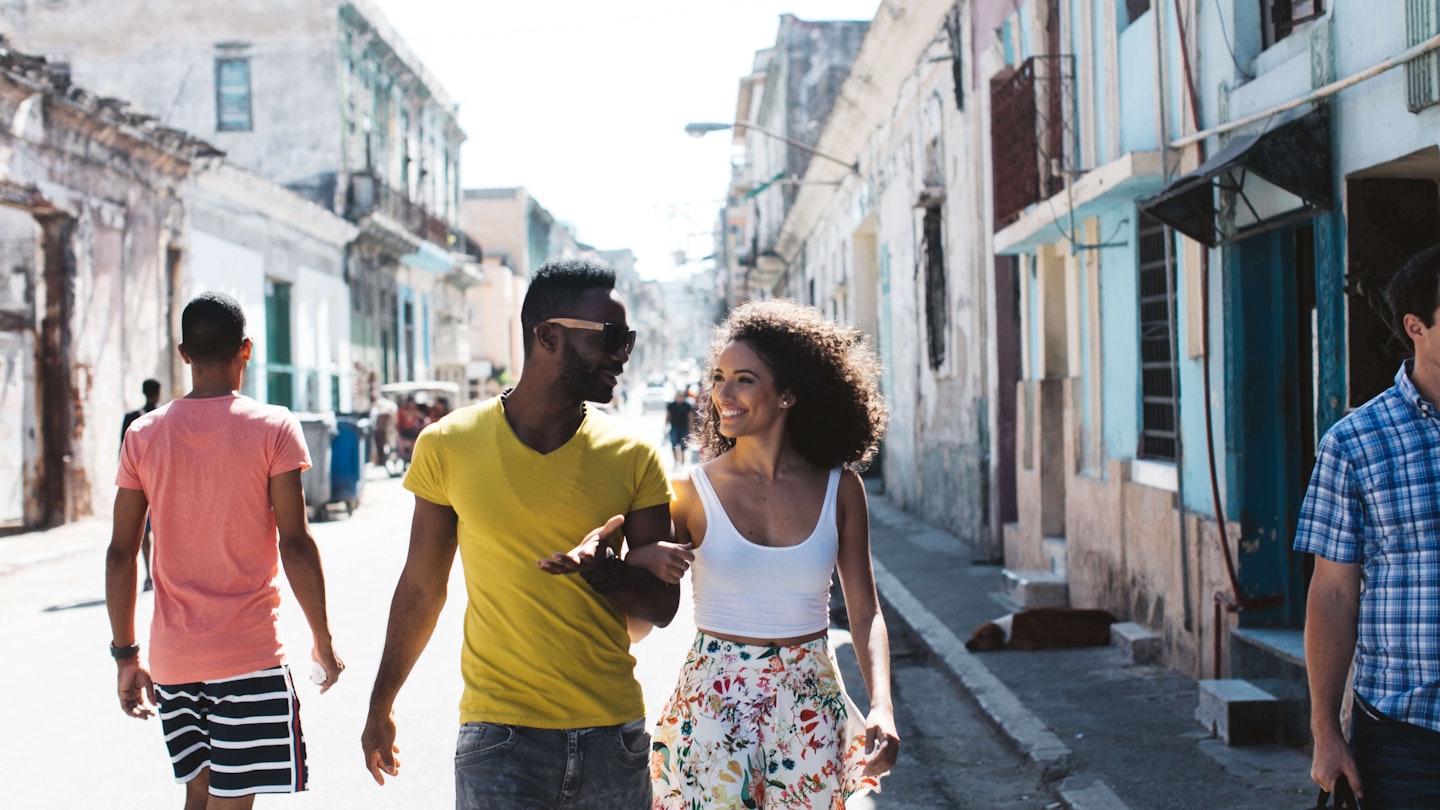
It may soon be easier for Americans to visit Cuba © Matt Porteous / Getty Images
The Biden Administration took several steps toward thawing US-Cuba relations on May 16, 2022, after five years of tightened restrictions. While the measures don’t fully restore the openings of the Obama era, they mark an encouraging start for struggling Cubans and aspiring US travelers.
What has changed?
Of direct interest to US travelers is the Biden Administration’s promise to expand authorized travel in support of the Cuban people. This includes opening up flights to airports beyond Havana (which were closed to US aircraft during the Trump era) and reinstating group people-to-people travel and other categories of group educational travel. Both measures will be good news to US travel agencies who have battled with increased red tape since 2017.
As yet, there is no word that the US will reinstate individual people-to-people travel, the category that led to a huge influx of US visitors to Cuba between 2016 and 2017. Nor have any Cuban state entities been removed from the US’s restricted list, meaning it’s still difficult for Americans to legally stay in Cuban hotels.
The directives have also lifted limits on family remittances (previously capped at $1,000 a quarter) to provide help in facilitating family reunions and supporting independent Cuban entrepreneurs.
Getting to Cuba from the US
Flying to Havana is one of the easier parts of the Cuba conundrum. As of May 2022, there are approximately a dozen flights a day between the US and Havana departing from the Florida cities of Miami, Tampa, and Fort Lauderdale. Operating airlines include American Airlines , Southwest Airlines , and JetBlue .
More Cuban airports will likely open up to US flights in the coming months.
The 12 categories of travel licenses for US citizens
US law states that US citizens can only travel to Cuba on a ‘general license’ based on one of 12 different approved categories , which include family visits, educational and religious activities, public performances and exhibitions, and the vague sounding 'support for the Cuban people.' Licenses are self-qualifying (there’s no long-winded paperwork), but you’ll be asked to state your category of choice in a signed travel affidavit when booking travel to Cuba. More details are available online from the US Treasury .
The vast majority of current visitors are Cuban Americans entering under the ‘family travel’ category. Independent travelers with no affiliations can qualify under the conveniently vague ‘support for the Cuban people’ category, which is the easiest option for people looking to explore the island. However, bear in mind that before you travel, you’ll need to draw up a detailed itinerary of your plans. Additionally, on your return, you’ll be required to keep all your travel receipts for five years.

The Cuba tourist card
To enter Cuba, all visitors need to present a completed Tourist Card — which serves a similar function to a tourist visa. These are usually available through your airline (ask when booking). Alternatively, you can purchase one through a Cuban travel agency. Costs range from US$50 to US$85, including processing fees.
Health protocols for travel to Cuba
Pre-travel COVID-19 tests and vaccination certificates are no longer required to enter Cuba from the US. Random COVID-19 tests may still be administered at the airport but there’s no mandatory quarantine unless you test positive. Departing US passengers will need a negative rapid-antigen test to re-enter the US. Tests can be procured at Havana’s José Martí International Airport before departure.
All arriving travelers must fill out an online D’Viajeros form containing information relating to public health and immigration. You’re also required to take out medical insurance that includes cover for COVID-19; this may be included in the cost of your air ticket from the US. Health officials make spot checks at the airport.

Booking travel to Cuba through a travel agency
If it’s your first time traveling to Cuba, it is highly recommended that you enlist the services of a specialist US-Cuba travel agency. Both Cuban Travel Services and Marazul offer comprehensive on-the-ground information and can help organize flights and accommodation.
Alternatively, you can join an organized trip, which takes a lot of the hassle out of traveling to Cuba. Long-time US-Cuba specialists, Insight Cuba are offering a three-night ‘Weekend in Havana’ and a seven-night ‘Classic Cuba Tour’ in 2022.
Where to stay in Cuba
American citizens are not currently allowed to stay in Cuba’s government-run hotels or use most state-owned enterprises. Instead, it’s best to opt for private accommodation such as apartments, B&Bs and homestays (known in Cuba as casas particulares ). Airbnb has lots of listings of accommodations that are open to US citizens.
For restaurants, stick to private paladares (family-run restaurants, often in the owner's home) where the food quality is better. To get around, use private guides and taxis. In doing so, you’ll be enthusiastically ‘supporting the Cuban people.’

Money tips for Cuba in 2022
Credit cards linked to US banks don’t work in Cuba and the US dollar was taken out of circulation in June 2021. American travelers are best off arriving with plenty of cash in a non-US currency – the euro is the most favored foreign currency and is accepted by most private businesses, from casa particulares to restaurants and taxi drivers, meaning you won’t have to buy many Cuban pesos (which are worthless outside Cuba).
Beware: The Cuban economy is in a state of extreme flux. The current euro-peso black market exchange rate is over four times that of the banks.
In November 2021, Cuba introduced a tarjeta prepago (prepaid card) designed primarily to aid US travelers with American credit cards. You can purchase and pre-load a tarjeta prepago at a bank in Cuba or at the airport and use it to buy goods that can otherwise only be paid for with a credit card, such as medical services, cigars, and bus tickets. Cards can be loaded with amounts equivalent to US$1000, US$500 or US$200. However, you can only pay for the card in a non-US currency. Euros, Canadian dollars, and pounds sterling are all accepted, cash only.
This article was first published December 2020 and updated May 2022
Explore related stories

Destination Practicalities
Jan 9, 2024 • 4 min read
Choose the best time for your visit to Cuba with this seasonal guide to lively festivals, top beach weather and budget prices.
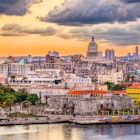
Jan 9, 2024 • 6 min read

Jan 7, 2024 • 10 min read

Jan 6, 2024 • 7 min read

Jan 5, 2024 • 8 min read

Jan 5, 2024 • 4 min read

Nov 24, 2023 • 7 min read

Jan 6, 2023 • 7 min read

Jan 5, 2023 • 8 min read

Oct 5, 2020 • 15 min read
Welcome to the Online Visa Application System of the Republic of Cuba.
Please, find the country where you are to fill out your application
Copyright © 2024. All rights reserved.
Designed By Zymphonies
Entry & Tourist Card
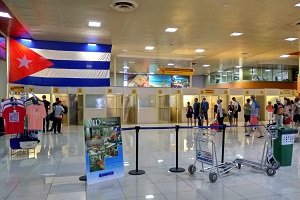
Updated: Dec 19, 2022
Entry Requirements (Tourist Card)
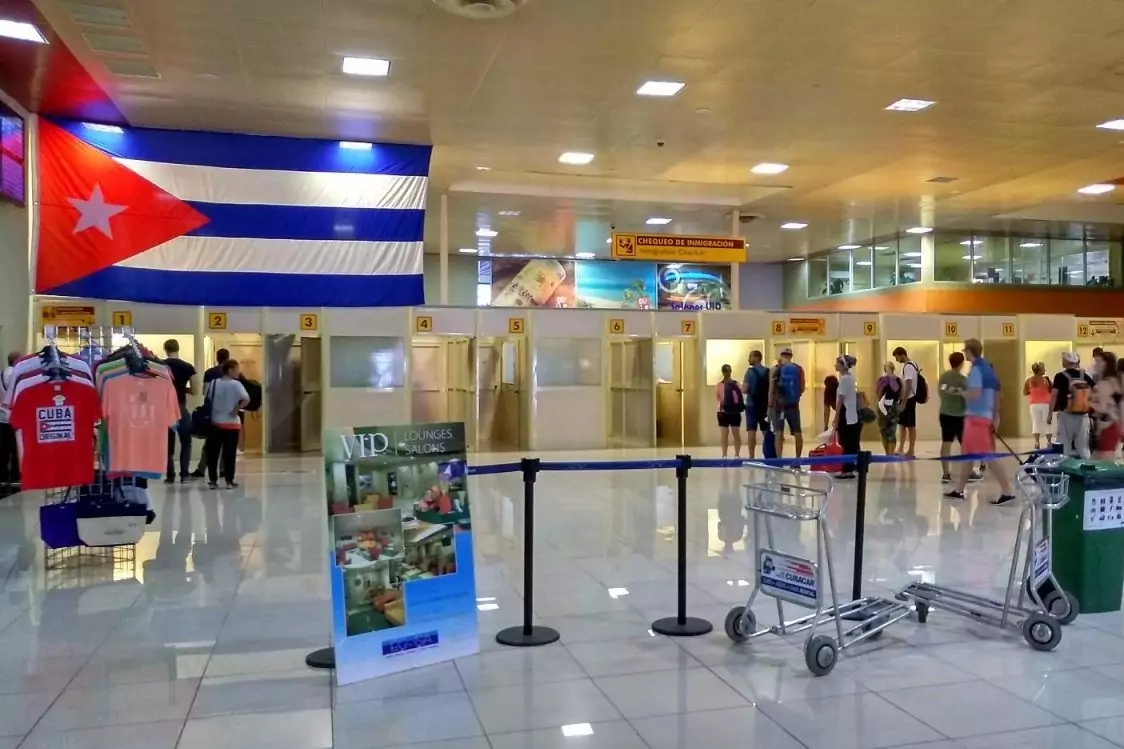
Which documents do you need to enter Cuba? For such a fundamental questiom here we give you all the information. You require: your passport, a tourist card and an appropriate travel health insurance. In addition, you will receive customs declaration forms in the plane, which must be filled and submitted when leaving the Cuban airport.
First, you need to know that anyone wish to come to Cuba as a tourist must have a valid ID number, health insurance and a visa, because the identity card is not enough for the entry. Your passport must be valid for at least six months at the time of entry.

Passport control: Entering Cuba
If it’s not, you can just get a temporary one and enter Cuba with it. Children also need their own ID document (children’s passport).
Furthermore, you must show a proof of the health insurance at the passport control when requested. It must confirm, in Spanish, the insurance coverage for all the time you are staying in Cuba.
What is a tourist card?
The tourist card is officially a visa for tourist purposes. In fact, with this card you are allowed to stay in Cuba for 30 days. In case you decide to stay longer, you can extend it for another 30 days, twice!
You must show it at the passport control at the airport in Cuba. Nevertheless, keep in mind that the tourist card is also checked on the way out at the exit control, and therefore you must keep it in a safe place.
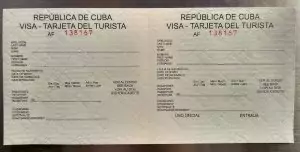
Tourist Card
With some tour operators or airlines, the tourist card is already included in the travel or flight price; this is more common with package tours. Some airlines also give their passengers the card for free, Air Canada for instance. In any case, if you are in doubt, you should ask the trip manager or the airline, so you won’t have to buy the card twice.
Surely if you do not show a tourist card at check-in in your home country, you run the risk that the airline will refuse to issue a boarding pass. Therefore, the card should be available, at the latest, when you check in.
Where to get the tourist card?
They are available at specialized travel agencies, Cuban consulates, online, or directly at major airports. Their cost is usually around 25 and 35 USD.
The easiest way to get it is at the airport, at the counter. Passengers can receive it at the transfer desk or directly at the gate. However, airports do not guarantee this sale. To be sure, you can always get in touch with the airline or the airport beforehand.
You can also get it from the internet in a quick and safe way. It will be sent to you as a letter, and you will receive it in a few working days.
On the other hand, buying it at the Cuban embassies or consulates is not recommended. Because, for instance: those who do not appear in person must pay an extra fee for being absent, and you will have to wait for it for a long time. But if you still want to try, you will need to take a proof of the health insurance coverage in Cuba and your passport. Fortunately, you will get the card filled out, but you can also do it by yourself without this service.
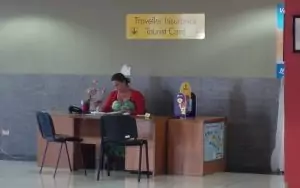
Tourist Card at Varadero Airport
In conclusion, travelers should find a way to have the card in advance. However, at the latest you can buy it at the airport, often directly at the gate. For instance, those arriving from Panama or Mexico can get it at the gate for around 20 USD. On the other hand, travelers coming from the US must have a special tourist card (pink) which are available at the airport or online.
If you can make it to Cuba without the card, you can acquire it on the arrival at the airport, but it is relatively expensive (75 USD).
How to fill the Cuba tourist card?
Once you have it, you should fill it at the latest in the plane. Make sure you do not make mistakes, because if you do, theoretically you will have to buy a new one. Fill it with your last name, first name, date of birth, passport number and citizenship ; same information on both sides .
What if you lose your tourist card?
You must show this card at control points during the stay and, when leaving the country the card is checked and retained, that is why you should always keep it in a safe place. In case you lose it during your stay in Cuba, go to an immigration office and have a new card issued, the cost should be around 25 USD. If you cannot get a replacement card soon enough, or find out that it is missing at the airport, then you will have to pay extra when leaving the country.
How to extend your stay
In this case, you will have to buy stamps worth 25 USD at a Cuban bank. Then go to an immigration office, and take with you the stamps, the tourist card, your passport, a receipt from the accommodation and a proof of a health insurance covering the period of your stay; then you will get your extension. Also, you should know that you can do this twice, the widespread information that you can only do it once, is wrong.
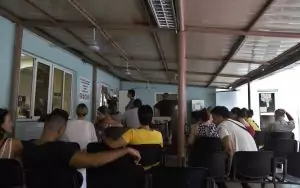
Waiting at the Immigration (Vedado 2018)
There is an immigration office in Havana, not far from Habana Libre Hotel, on the 17th street (calle 17 y K); you should expect a long wait in line there. There is also an immigration office at each provincial capital and in Varadero.
If you want to stay longer than 90 days, you can either re-enter or enroll in a language course and apply for a temporary residence permit.
What about your health insurance?
Travel or International health insurance must be available upon entry. You should also take a look at the information on medical care and health risks on it. If your health insurance covers the stay, you will need a confirmation written in Spanish. It must be specified on the document the protection for Cuba and the covered period of the trip.
In case you do not have it, you can easily get one online for a reasonable price, and it should include several important benefits. However, if you cannot get it online, buy it at the airport, but it will not include some essential services and the price is higher, so we do not recommend it.
Customs declarations:
You will get one on the flight, and you must fill it and give it to customs when you leave the airport. There you must state your name, flight number, airline, cash holdings (up to 5000 USD), medication and any possession of forbidden items such as drugs and pornography. If you make a mistake filling it you can get a new one at the airport. If you need, you can get advice from the customs staff in case you are carrying special items, which you can import in reasonable quantities taking into account the length of the stay and the purpose of the trip. These items are, for example, cell phones, laptops, cameras, binoculars, music instruments or bikes. Obviously, these forms have no significance for normal trips.
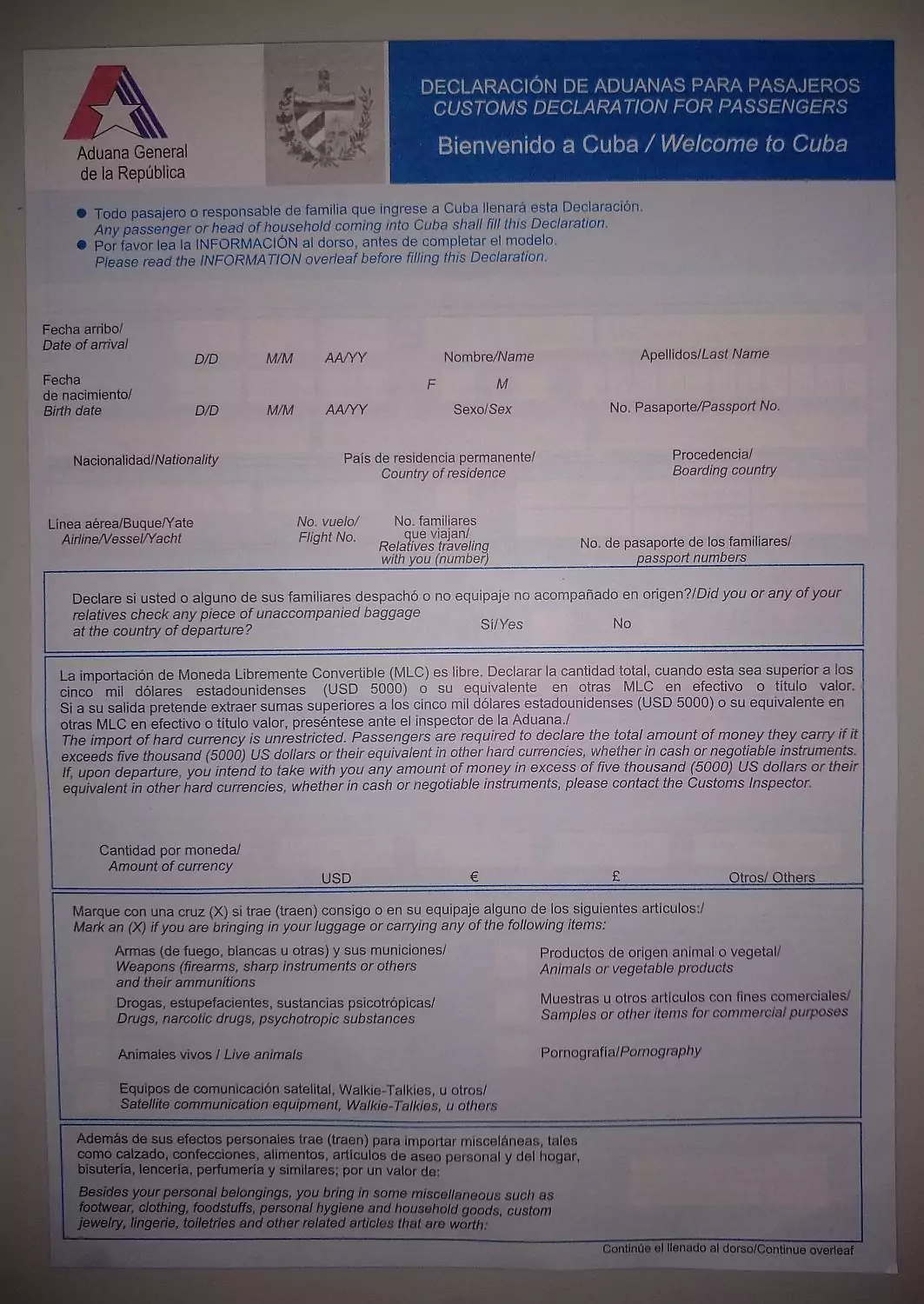
Customs declaration Cuba
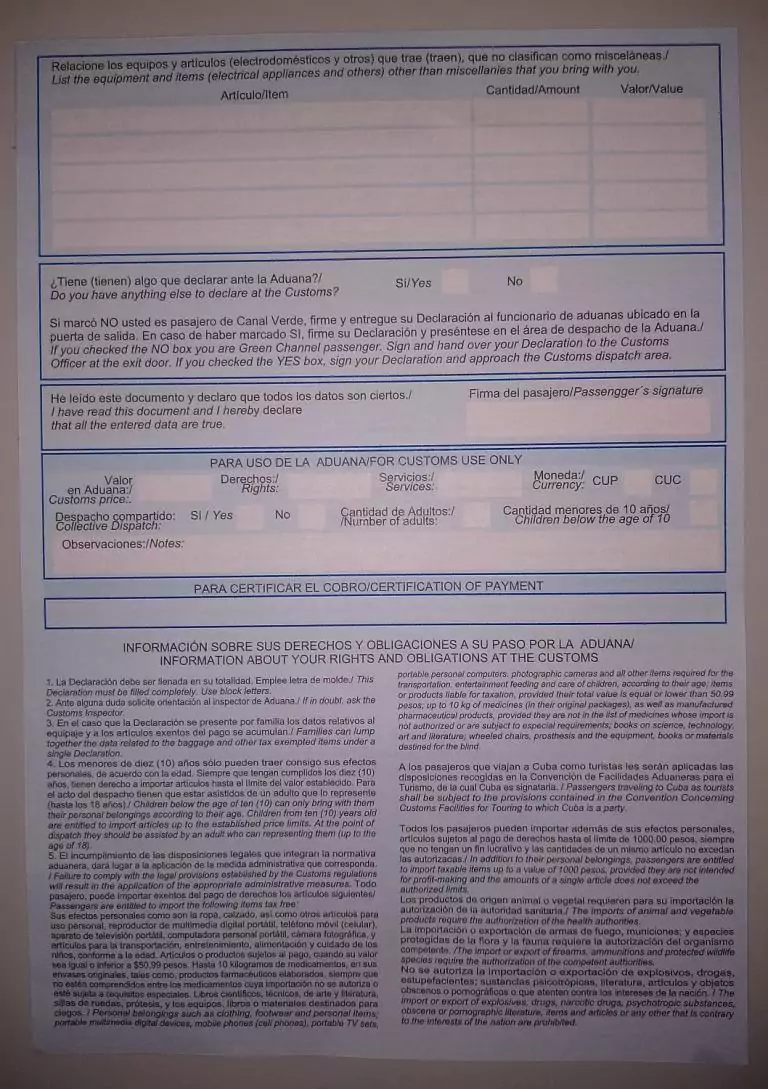
Custom declaration II
What is not allowed to bring to Cuba? (Customs regulations)
Big quantities that exceed personal needs must be declared and cleared out through customs. In extreme cases, some of your goods can be taken away; this is of course, in case you are trying to import a non-personal amount of things and/or forbidden ones.
If you are trying to take gifts, up to the cost of 50 USD, they can be imported without any tax, what is not the case of gifts from 50 to 250 USD, where you will have to pay a tax worth the gift value (100%).
With electronic devices, you should expect that customs would detect them during an X-Ray check of your luggage and charge you an import tax as well.
On the other hand, the import of two way radios and satellite cell phones is forbidden without permission. In general, it is better to be careful with electronic devices and only carry one of a type. If you are traveling with two laptops for professional reasons, you should not have any problem, that is also the case of photographers who are traveling with two cameras. The customs control help prevent black market and levy import duties. The important decision lies in whether the goods should remain in Cuba or not.
The same happens with bikes and any other sport equipment, if you want to import them for personal use, there should not be any problem or any tax applied. This is also the case if you want to import up to 10 kg of medication.
On the other hand, the import of any kind of fresh food (fruit, vegetables, meat, dairy products) is forbidden in Cuba for health reasons, it must be thrown away upon entry. In absolutely no case, you should bring drugs to Cuba, customs make regular checks with drug dogs, and even the possession of light drugs such as marijuana is punishable by serious penalties.
Short-term adjustments can be expected. Therefore, we recommend you to check the detailed information on the Cuban import and export regulations on the website of Cuban Customs.
Good to know
Upon entry, a picture of every passenger will be taken at passport control. Formally, you should show a proof of a return ticket when entering Cuba. But they actually don’t check if you have it or not.
If you own a Cuban citizenship and any other country citizenship, you will be treated exclusively as a Cuban citizen by the authorities, this means the mandatory use of your Cuban.
Departure time!
Some years ago, you would have been forced to pay and exit tax, but you don’t have to anymore. What you will have to do, is presenting your passport and tourist card (this one will be withdrawn). Anyone who stayed longer than the established 30 days will have to pay extra.
The good part is that the security check is usually quite quick. You will have to take off your shoes and you will not be able to take lighters into the plane with you, so better leave it in the check-in luggage.
Take into account that the suitcases spend some time at the airport before being loaded into the plane. Therefore, sometimes, items get stolen from the suitcases. Our recommendation is to put your valuables in your hand luggage.
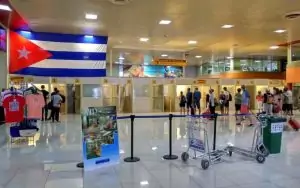
Leaving Cuba
In case you want to take cigars with you, first check the export regulation for tobacco products. Without a proof of your purchase, you can take with you up to 20 cigars; you should have an official receipt to take more. In addition, they should remain in their original sealed package.
You are not allowed to export Cuban money, but if you want to take a few pesos with you as a souvenir, it’s OK.
Some souvenirs, like photos and art paintings are subject to a tax that is usually below 10 USD. Be careful with trying to take some souvenirs that violates species protection and also, antiques; their exportation is generally forbidden.
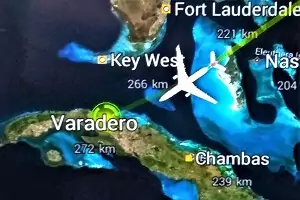
Stay Healthy
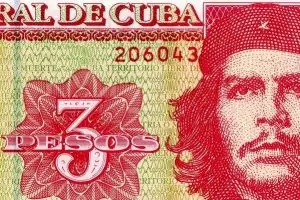
Money & Currency in Cuba
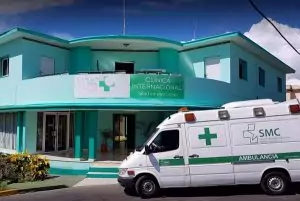
Health Insurance
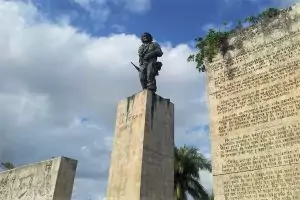
Gifts & Donations

Packing list

Electricity (Plug Adapter)
you're currently offline
- Travel Guides
Cuba Entry Requirements
Preparing for a trip to Cuba involves more than grabbing your passport and favorite travel bag. Here’s a list of what you must do, as well as suggestions for things you ought to do, before hopping on a plane or boat to Havana.
If you're accustomed to island hopping at the drop of a hat, understand that you will not be able to travel to Cuba at the drop of a hat. The best time to go to Cuba isn't simply a matter of weather, it's also a matter of when you will be permitted to enter the country. As a nation with a communist government , gaining entry into Cuba requires special permission. The details of entering Cuba are outlined below:
Travelers to Cuba must present a valid passport. To avoid having to update any travel documents during your stay, make sure your passport is valid for the entirety of your trip (ideally several months longer).
Tourist visas are also required for all visitors. Entering Cuba without government authorization — your 30-day tourist visa — is illegal, and can result in arrest and serious jail time. If that’s not the kind of wild trip you’re looking for, apply for a visa at the nearest embassy or consulate of Cuba.
Canadian citizens can enter Cuba without a visa if the trip is for tourism purposes, but they must have a visa for any business travel.
Medical Insurance
Vaccinations are not required to enter Cuba, though they are always recommended. An immigration officer will check for proof of medical insurance when you arrive. Cuba does not accept U.S. insurance policies. Call your insurance provider to see if you’re covered overseas, or apply for insurance with Cuba’s Travel Insurance organization, Asistur S.A.
Make sure you have full coverage during your trip – not just during your time in Cuba. Read " Going Abroad? This is Why Travel Insurance is A MUST! " Then, get your personalized quote here .
U.S. Citizens need a special license to enter Cuba
It’s important to note that the U.S. government still does not sanction tourism to Cuba. Travel must fall into one of these 12 categories to be considered legal:
Family visit
Official government work
Professional journalism
Professional research (via a business)
Educational activities
Religious purposes
Public performances (i.e., music, theater), workshops, exhibitions, athletic competitions, or aiding a clinic
Directly helping Cuban people
Humanitarian reasons
Research on behalf of a private foundation or a university
Exportation, importation, or informational exchange
Certain transactions (like export) may be considered for authorization.
To learn more about traveling to Cuba as a citizen of the United States, read " How to Legally Travel to Cuba As An American ."
Traveling to Cuba with minors
To prevent child abductions, countries including Cuba have established entry and exit checkpoints. At these checkpoints the parent or guardian will need to provide documentation of his or her relationship to the child. This is not an official requirement of entry into Cuba, but it is recommended that travelers in question have those documents on hand, for an easier entry or departure, and to avoid potential hassles.
Register your trip
A recommendation from the U.S. Embassy in Havana: register with the American Citizens Services Unit before your trip. Visit the STEP (Smart Traveler Enrollment Program) website to register, or register in person at the very beginning of your visit at the U.S. Embassy of Havana. In a country where Internet isn’t exactly easy to come by, and your cell phone plan will not work, alerting the embassy to your basic travel plans can help your loved ones get in touch with you in case of an emergency, and help the U.S. Embassy find you and potentially rescue you in case of a natural disaster or civil unrest.
Canada offers a comparable service called Registration of Citizens Abroad, with a simple sign-up process to keep Canadians safe in their world travels. Both STEP and the Canadian program also offer travel alerts, so travelers can have up-to-the-moment advisories on security risks. This allows them to make informed decisions about their travel plans.
When you enter Cuba you must provide proof of your departure.
Do your research
This isn’t an official requirement, of course, but ensure that you know the rules that will affect you before your visit. OFAC (Office of foreign assets control) has certain regulations — for example, persons authorized to travel to Cuba may purchase alcohol and tobacco products while in Cuba for personal consumption. Authorized travelers may also return to the United States with alcohol and/or tobacco products acquired in Cuba as accompanied baggage for personal use. OFAC considers “personal use” of an imported item to include giving the item to another individual as a personal gift, but not the transfer of the item to another person for payment or other consideration. Find up-to-date information on the U.S. Treasury's website.
Read our extensive list of Frequently Asked Questions by travelers visiting Cuba. You can always ask an Anywhere expert to answer your questions and concerns via chat, phone call, or a travel planning request .
When you finally arrive in Cuba, you will (technically) have multiple options for getting around . However, much like gaining entry, this island nation is not without its quirks — it's also not as tiny as travelers seem to think it is when they actually try to traverse it. When traveling around Cuba, we recommend that you book private transportation. If you plan on flying whilst on the island, be sure to book your flights in advance, you do not have to pay a departure tax in Cuba anymore, it is now included in the cost of your airfare.
The most seamless way to plan


Everything you need to know about Cuban visas
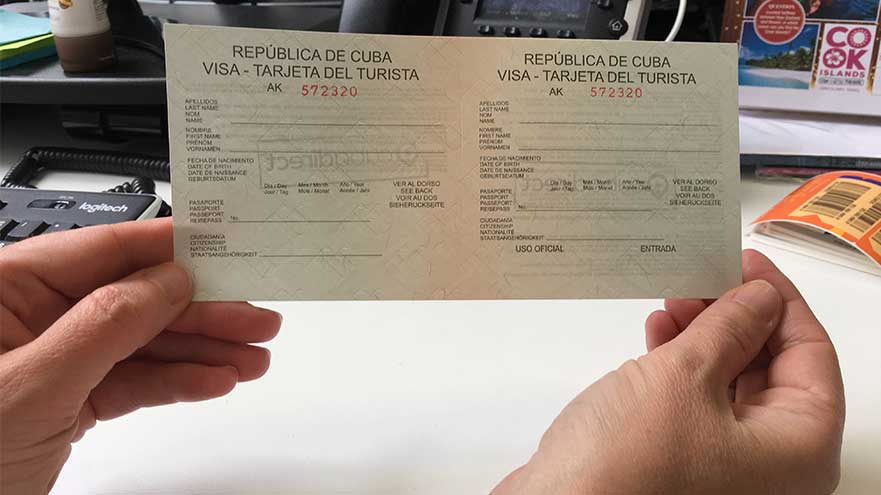
The names they go by and the different types that exist!
What is the difference between a Cuban visa and a tourist card? Can I apply for a Cuban visa with a U.S. passport? Will I need to travel to Cuba with a different visa if flying from the U.S.? What is the difference between a pink card and a green card ? How many different types of visas are there to enter Cuba? We understand that when it comes to the legal documentation required to enter Cuba it can all become a bit too confusing for most people, so we're here to clear things up and break it all down to simple terms that are easy to understand.
The document you'll need to enter Cuba is known by multiple names – Cuban visa, tourist card, pink card, green card... It can get confusing, right? That's why we're here to dispel myths and explain it all in simple terms. Yes, you can travel to Cuba without a visa (if you hold a passport from any of the countries listed further down below) and the most common type of Cuba visa is actually a tourist card, it's just the fact that many people call it Cuba visa that makes it confusing. To add to the confusion, there is actually such a thing as a Cuba visa, but only a few African and Middle Eastern countries require a Cuban visa instead of the more common Cuban tourist card.
Untangling the Cuban visa/Cuban tourist card confusion
There is more to travelling to Cuba than getting a visa. In fact, getting a Cuban tourist visa can be the easiest, most straightforward part of your trip (especially if do it through us!) but many people are confused about the jargon and the different names used to refer to a Cuban visa (early clue, that's not what it's actually called!). Let's start untangling the mess and setting facts right in 3, 2, 1...
What do I need? Pink card visa or green card visa to enter Cuba?
If you travel to Cuba from the U.S. the type of Cuban tourist card, you'll need is different, and more expensive, than the ordinary green Cuba Tourist Card. If you're flying to Cuba directly from a U.S. airport, you'll need to request a pink card, which looks almost exactly the same as the green Cuba Tourist Card but is only for those who fly to Cuba from the U.S., regardless of your nationality. Please do not confuse the need for a pink Cuba Tourist Card with holding a U.S. passport. You can be a U.S. passport holder but if you travel to Cuba from any country other than the U.S. you can apply for the cheaper green Cuba tourist card instead. Likewise, you can have a nationality other than the American one, and if you fly from a United States airport to Cuba, you will need a pink tourist card (visa).
Ultimately, the colour of your card depends on the last place you depart from before arriving in Cuba. So, for example, if you start your journey in the U.S. but then stop in another country before arriving in Cuba, you can travel to Cuba with a green tourist card instead. It's only if you depart directly from the U.S. before landing in Cuba that you'll need the pink card. Please remember that you will not be allowed to board a flight from the U.S. to Cuba with a green tourist card!
Also please be aware that if you travelled to Cuba after January 12, 2021, individuals visiting Cuba will no longer qualify to enter the US under the ESTA Visa Waiver Program . This does NOT imply that you cannot visit the United States. It merely indicates that to visit the US subsequent to a trip to Cuba, you will need to apply for a standard visa at a US embassy or consulate.
US legislation prohibits direct travel from the USA to Cuba for tourism purposes. This regulation applies to both US citizens and foreign nationals who are residents in the USA or transiting through the USA on their way to Cuba. However, international travellers on direct flights between their own country and Cuba, or via other countries (excluding the US), are not affected by this US law. Nonetheless, travel from the USA to Cuba is permitted under certain circumstances, including on direct flights operating between the two countries. All passengers on these routes, regardless of nationality, must adhere to US regulations and travel for one of the 12 approved reasons/categories. On our website, you can obtain a specific tourist card (pink visa) required for travel between the US and Cuba. You must also select and declare the category (reason) of your trip. While most passengers choose to travel under the category "Support for the Cuban People", you should evaluate all the categories listed in the online form and select the one that best fits your circumstances. For better reference, please check here: 12 OFAC-approved categories .
A Cuban visa or a tourist card?
If you're wondering whether you'll need a Cuba tourist card or a Cuban visa to enter Cuba, the answer is that both terms are widely used interchangeably to mean the same. But they're actually different. Most people refer to the Cuban tourist card as a Cuban visa, but a Cuban visa is rarely needed. Only a minority of countries (around 25 nationalities), like we explained earlier, will need to apply for a Cuban visa instead of a Cuban tourist card.
Who needs a Cuban visa?
If you hold a passport from any European country, rest assured that you'll need the ordinary Cuba Tourist Visa, to enter Cuba. If you're not from Europe or the Americas, you might need a visa, basically if you're either from the following countries you will need to apply for a Cuba visa:
- Afghanistan
- Philippines
- Sierra Leone
- Natives of the Fujian Province in China
Visa exemptions and entry regulations change from time to time so that some countries may be removed or added from this list. If in doubt, get in touch or give us a call!
Who can apply for a Cuban tourist card?
As we were saying, the vast majority of nationalities do not need a Cuban visa to enter Cuba and need only apply for a Cuban tourist card, which, unlike Cuban visas, can be requested and processed online by accredited companies (like ours) in a few simple steps.
If you hold a European, North American, South American, or Central American passport you can apply for a Cuba tourist card either through the Cuban consulate in your country or residence or through an accredited provider like us.
How do I apply for a Cuba tourist card?
The process of applying for a Cuba tourist card is very simple and straightforward. You can do it online, by phone or in person at a Cuban consulate in your country of residence. You'll need to provide a few details like passport number (along with passport or passport scan if doing it online), postal address, address of where you're planning to stay in Cuba (a hotel name will suffice) and copy of return flight tickets.
If you do it through the Cuban consulate you can fill in a form available to download online but you'll still need to hand it in person and collect the tourist card in person. Alternatively, if you opt for applying for your Cuba tourist card online, the accredited visa provider will take care of everything and you'll receive your Cuban tourist cards at home in a matter of days (faster if you use our Priority Service ).
If you're in the U.S. or will be travelling to Cuba directly from the U.S. you will need to get your hands on a pink Cuba tourist card, available through U.S. airlines (you can buy them at the gate) flying to Cuba or by contact the Cuban Embassy in Washington.
Will I need a Cuba visa for my Cuba holiday? Do UK visitors need a visa to enter Cuba?
As a British national, for your visit to Cuba you will need a Cuba tourist card, issued by the Cuban consulate in your country of residence but also available through other external providers, like us - we make the process fast, easy and 100% online with no need for you to step into a consulate... thus saving you a 2-day ordeal!
I'm not from the UK / I don't have a UK passport / I have dual nationality with another country; will I still need a visa to travel to Cuba?
There are a number of countries that have bilateral agreements in place for travel to Cuba and are therefore exempt from applying for a Cuba visa or having to purchase a tourist card. In other words, citizens (passport holders) from the below-listed countries are free to travel to Cuba with no extra documentation required (a valid passport will suffice).
No Cuban visa or tourist card required for a visit with a maximum duration of 90 days for nationals of:
- Bosnia and Herzegovina
- North Macedonia
No Cuban visa or tourist card required for a visit with a maximum duration of 60 days for nationals of:
- Saint Vincent and the Grenadines
No Cuban visa or tourist card required for a visit with a maximum duration of 30 days for nationals of:
- Saint Lucia
- Saint Kitts and Nevis
- Antigua and Barbuda
No Cuban visa or tourist card required for a visit with a maximum duration of 28 days for nationals of:
Likewise, Cuban passport holders are free to visit the above-listed country without the need to apply for a visa.
So, what is a Cuba tourist card then?
A Cuba tourist card is a small card that needs to be manually filled in with your details and must presented to immigration authorities upon entry and departure to Cuba. As it's not a “sticker” type of visa attached to your passport, the process of obtaining one is easier and more straightforward as it can be done remotely, but you must be careful of not losing it!
It's important to keep your Cuba tourist card in a safe place and try not to lose it during your holiday as it must be shown to immigration authorities before you board the plane back home and if you fail to produce it on the spot you could be delayed while they run checks, risking losing lose your flight. Mind that tourist card!
How long will the tourist card allow me to stay for in Cuba for?
Cuba Tourist Cards (Visas) do not come with a set expiration date. Their validity starts upon entry into the country, allowing for a 90-day stay, with the option to extend for an additional 90 days while in Cuba (requiring contact with immigration authorities once in the country for the extension). Upon arrival in Cuba, your tourist card will be stamped with the entry date, and upon departure, it will be stamped with the exit date. Since these visas are single-entry documents, their expiration coincides with the date of departure from Cuba.
Will I need any other documentation to enter Cuba?
All visitors to Cuba need to present a valid passport (and travel at least 2 to 6 months prior to its expiry date, the exact amount of time allowed before its expiry depends on the country you're flying from, it's 2 months for Canadians for example but 6 months for travellers from Europe) as well as health insurance. When it comes to health insurance authorities may ask for it at the airport and if you don't show one, they'll make you buy one on the spot.
Kindly ensure to fill out the Health Declaration (Advance Passenger Information) online. You must complete it up to 48 hours prior to your flight. It's important to note that this is not the same form as the Cuba visa application. The traveller’s declaration forms that were previously filled out on paper upon arrival in Cuba now need to be completed electronically at DViajeros (gob.cu) .
Other things you need to know before travelling to Cuba.
Beyond having a valid passport, getting travel insurance (it's compulsory for visitors from the U.S) and health insurance (it's compulsory for everyone, even Cubans living abroad), there are other things you should know ahead of your trip to Cuba.
Vaccinations
Cuba is one of the healthiest countries in Latin America with free public healthcare coverage that provides all recommended vaccinations from birth.
For international travellers up to date with the national vaccination courses and boosters, no extra vaccinations are advised for travel to Cuba. You may consider getting vaccinated against Hepatitis B, Rabies and Tetanus but it's not regarded as imperative. Other vaccines advised selectively for only those at risk are Cholera and Hepatitis A vaccines.
Drinking water from the tap is highly discouraged as a few years ago there was a massive cholera outbreak. When in Cuba always drink water from a sealed water bottled (check it's sealed) or if you're going to accept homemade juices or smoothies check that they've boiled the water first (at home Cubans boil the water they drink as a precaution).
Getting your Cuban tourist visa/card is as easy as 1,2,3
As you can see the Cuban visa/Cuban tourist card debacle is not as hard to demystify as you probably thought, but if you still have questions check our FAQs section, and if you still have questions after that, we at Visa Cuba will be more than happy to help you find the right answer. Get in touch by dropping us an email via our online contact form . Don't forget that we're recommended by both Lonely Planet and TripAdvisor and are also fully authorised by the Cuban Consulate in the United Kingdom as official Cuba tourist cards providers. It would also not be excessive for your peace of mind to consult the reviews of our clients on Trustpilot and Feefo , which show the level of satisfaction achieved
SELECT A TYPE OF VISA
Select the type of visa you will need. Pink visas are required for those travellers beginning their journey in the US to Cuba . For those who travel from the Rest of the World to Cuba , they must opt for a green visa .
Choose this option if you are arriving from any country, except the USA

Choose this option if you are travelling to Cuba from or via any US airport
YOUR CUBA VISA FROM OFFICIAL PROVIDERS
Visa Cuba is not only official partners with the Cuban Consulate. We are the UK’s oldest and best reviewed Cuba Visa application service. We take pride in our flawless review record with independent review services. No fake news. Only authentic reviews from verified customers

- Process and Delivery
- Terms of Use
- Privacy Policy

Cuba Tourist Card: 5 Ways to Get the Cuba Tourist Visa in 2023
If you go to Cuba for tourism, you almost certainly need a Cuba Tourist Card or Tourist Visa. But there is the green and the pink Tourist Visa, which one should you get? What if you are flying from the US?
This article will cover everything you need to know about the Cuba Tourist Visa, including how to apply for the right one, depending on where you are flying from.
What Is the Cuba Tourist Card?
The Cuba Tourist Card (“ Tarjeta del Turista “), also known as Cuba Tourist Visa, temporarily permits foreign nationals to visit Cuba for leisure.
If you travel to Cuba for non-tourism purposes, you will need a regular visa .
Who Needs a Cuba Tourist Card?
Almost everyone traveling to Cuba for tourism needs a Cuba Tourist Card (“Tarjeta del Turista”). The only countries exempt from the Cuba Tourist Card are Antigua and Barbuda, Barbados, Belarus, Benin, Bosnia, China, Dominica, Grenada, Macedonia, Malaysia, Montenegro, Mongolia, Namibia, Saint Kitts, Saint Lucia, Saint Vincent, Serbia, Singapore, and Vietnam.
How Long Can You Stay in Cuba With the Tourist Card?
The Cuba Tourist Card grants visitors a maximum stay of 90 days in Cuba. However, travelers can extend it to 180 days while on the island.
How Long Is the Cuba Tourist Card Valid For?
The Cuba Tourist Card does not expire before entering the country. Therefore, you can travel at any time after getting the visa.
Is the Cuba Tourist Card a Single-Entry or Multiple-Entry Visa?
The Cuba Tourist Card is a single-entry visa.
Pink or Green: What Cuba Tourist Visa Should You Get?
An interesting fact about Cuba is that Cuban Tourist Cards come in pink and green colors. The color depends on the country of origin you’re traveling from.
If you travel directly from the U.S. to Cuba, you’ll need a pink Cuban Tourist Card.
Travelers who fly to the island from a non-U.S. airport must bring a green Cuba Tourist Card. For example, if you are a Canadian flying to Cuba from the Toronto Pearson Airport, you need the green version.
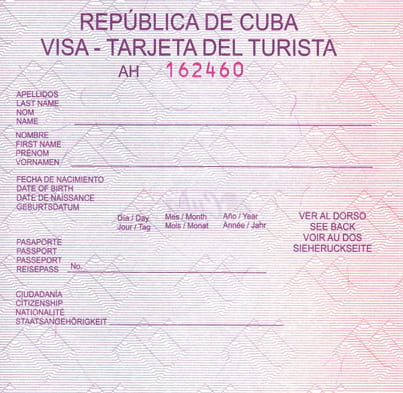
Knowing the distinction between the two colors is easy, but knowing which one to buy can be trickier, especially if taking a multi-leg flight.
Before buying your card online, look at your itinerary and check the last airport you depart from: this airport determines which color card you need.
FYI: pink cards are pricier than green cards because of the rocky relationship between the U.S. and Cuba.
What Cuba Tourist Card Do You Need if Traveling From the U.S.?
If you fly to Cuba from the US, you’ll need a pink version of the Cuba Tourist Visa.
If you fly from a third country, you’ll need the green Tourist Card, even if you’re an American citizen!
Remember that the U.S. government has a few other stipulations for American travelers. For example, before you head to Cuba, you must declare a travel category, like Support for the Cuban People . It sounds tricky, but we promise that our article for Americans traveling to Cuba makes it easy.
What Are the Cuba Tourist Card Requirements?
The application process is easy, and you only need to fulfill a few requirements . Here’s what you need to get a Cuba Tourist Visa:
- Valid passport
- Application form
- Travel itinerary
- Travel health insurance (we recommend Insubuy for comprehensive travel medical insurance for Cuba )
If you only have the first two, you can still get started with your application. You’ll only need your itinerary and travel insurance when you arrive at the airport in Cuba.
How Much Does the Cuba Tourist Card Cost?
You can expect the Cuba Tourist Card to cost anywhere between $35 and $100 U.S. dollars, depending on where you get it. While the card’s price isn’t high, you may have to pay additional airline or shipping fees if you order it online.
Look at the section below for a more detailed price breakdown for each option.
How to Get a Cuba Tourist Card?
You can get the Cuba Tourist Visa online, from your airline or travel agency, or at the Cuban embassy in your country. There’s no right or wrong way, but you’ll probably find that some methods are easier or less expensive than others.
Here are the four ways to get a Cuba Tourist Card for your upcoming trip:
1. Buy it Online
This is by far the easiest way to get your Cuba Tourist Card. Sites like EasyTouristCard make ordering quick and convenient from the comfort of your home.
You can purchase it well ahead of time and have it mailed to your address within a week, so you don’t need to worry about picking it up at the last minute.
You’ll also be able to skip the Tourist Card line at the airport, so you have to stand in one less line before arriving in sunny Cuba.
2. Buy it From Your Airline
Some airlines allow you to purchase the Cuba Tourist Card directly from them. Every airline handles the Tourist Card process differently, so we recommend checking in with your airline of choice to ensure you’re on the same page.
Some airlines have you pick up your tourist card at the gate before boarding your flight, while others hand out the card mid-flight. If you need to pick up your card in person, pad in some extra time if there’s a line.
The cost of the Cuba Tourist Visa is usually bundled in with your flight, but the price itself (shown in USD) varies from airline to airline.
- American Airlines : $85.00 ($50.00 visa price + $35.00 processing fee). Buy your card online or at the gate in Miami before departure.
- Southwest : $75.00 ($50.00 visa price: + $25.00 processing fee). Order online or via phone and pick up your card at the Ft. Lauderdale (FLL) or Tampa (TPA) airport at the check-in or departure gate.
- Delta : $50.00. Purchased at the gate.
- Jet Blue : $50.00. Purchased from JetBlue at gateway airport.
- Air Canada : Passed out during the flight.
- United Airlines : $75.00 ($50 Visa price + $25 processing fee).
3. Buy it From Your Country’s Cuban Embassy or Consulate
This is the hardest way to buy the Cuba Tourist Visa since you have to go in person with the necessary paperwork . Price varies depending on the embassy, but you can expect to pay between $35 and $75 for the card.
4. Buy it from your travel agency
Traveling through an agency or tour company can be extremely helpful since they’ll take care of most of the details for you – as long as they’re reputable. Most travel agencies will bundle the Cuba Tourist Card into their existing Cuba travel packages.
5. Get it upon arrival
Technically, you can get the Cuba Tourist Visa at Havana Airport , or any other Cuban airport, for about $25 (you can’t purchase it in Cuban currency or U.S. dollars). However, you can’t even board your flight in most cases if you don’t have a Cuba Tourist Card.
If somehow you manage to get to Cuba without a card, prepare yourself for the experience of navigating the Cuban infrastructure, which could entail long lines, empty booths, and slow service. This will be a true test of your patience since you won’t be able to leave the airport until your Tourist Card is in hand.
Not Too Complicated, Right?
We hope this guide to getting the Cuba Tourist Card makes the process as smooth and stress-free as possible. Bottom line: if your airline or travel agency didn’t include the Tourist Visa, it’s better to purchase it online. If you are flying from the US, get the pink one; if not, apply for the green one.
Have you recently traveled to Cuba with a Tourist Visa? Tell us about your experience in the comments below!
Essential Travel Logistics For Cuba
Cuban Tourist Card – If your Cuban Tourist Card (a.k.a Cuban Tourist Visa) isn’t bundled into your airline ticket or travel package, buy it only through EasyTouristCard .
Travel Health Insurance – Travel medical insurance is an entry requirement for Cuba, so you can’t skip it. Travelers can get travel health insurance for Cuba via Insubuy . Travel protection benefits such as trip interruption and cancellation, baggage delay insurance, etc., are not required.
Essential Items to Pack – Bring the essential travel necessities that you may not be able to get in Cuba:
- First aid kit
- Hand sanitizer
- Water bottle with filter
- Mosquito repellent
- Pin adapter (for Europeans)
- Travel guide
- Spanish-English phrasebook
- Suggested Reading: The Cubans: Ordinary Lives in Extraordinary Times
Read our complete packing list for Cuba .
Find Accommodations – Find hotels or casas particulares (private accommodations) on Skyscanner , which lists thousands of accommodations available in Cuba.
Book Your Flight – Book cheap flights to Cuba on Skyscanner , our favorite flight search engine to find deals on flights to Cuba.
Share Article:
About the Author
Tour republic.
Tour Republic is a marketplace where you can discover, book, and review the very best experiences Cuba has to offer. We are a team of tourism professionals and journalists who have partnered with Cuban entrepreneurs to provide travel experiences that can transform your trip into a life-changing adventure. We also share our profound love for Cuba through in-depth travel guides, myth-busting articles, and captivating narratives. Whether you want to explore Cuba's wonders or understand its intricacies, our blog posts are your gateway to the heart of this extraordinary country.
Leave a Reply Cancel reply
15 comments.
I want to go to the country
I am burundi citizen residing in saudi arabia, am willing to visit cuba but i can not buy online the cuba tourist card because they show me that the shipment is not possible. can you help me
Hello, About how long does it take for the online green visa to be approved?
i am citizen of Azerbaijan can I travel from US to Cuba or from Cuba to US?
Travelling to Cuba from Ontario, Canada with Air Transat. What is our process for the travel card? January 8, 2022
I am Singaporean. Flying to Havana via Paris. Do I need the tourist card?! Is it true that Singaporean exempted?
Watet bottle with filter ????
Can we not buy bottled water in Cuba??
yes you can, and some of your accommodations will arrange for it in advance. So, you just tell them how many bottles, and you pay your host
If I’m a citizen of the Philippines but traveling from the US, do I need to get a visa of Cuba?
Unfortunately, if you are traveling from the US, you will have to abide by the same rules as US citizens. So, you may consider a different route of travel.
Thank you – such a clear explanation, and the only one that answered every question for me!
I successfully made it to Cuba from Miami after years of doubts.
Can I use either the pink or green card ? I’m entering through jamaica and returning straight to the us
Hi, I have gone to the Cuba embassy in Mexico but surprisingly the visa they gave me is the same with the visa tourist after checking the one on your website here. Please are you sure they will allow me entry and will I still need to buy a cuba tourist card again. Your answer is greatly appreciated
Am a Nigerian tourist in Mexico, will I need a visa or just tourist card to go to Cuba from mexico, please kindly inform
Hi Adebisi, You will probably need a visa to Cuba. I would advise you to contact the Cuban embassy in Mexico to get a more accurate answer.
You might also like

Cuban Currency: The Ultimate Guide for Travelers (2024 Update)
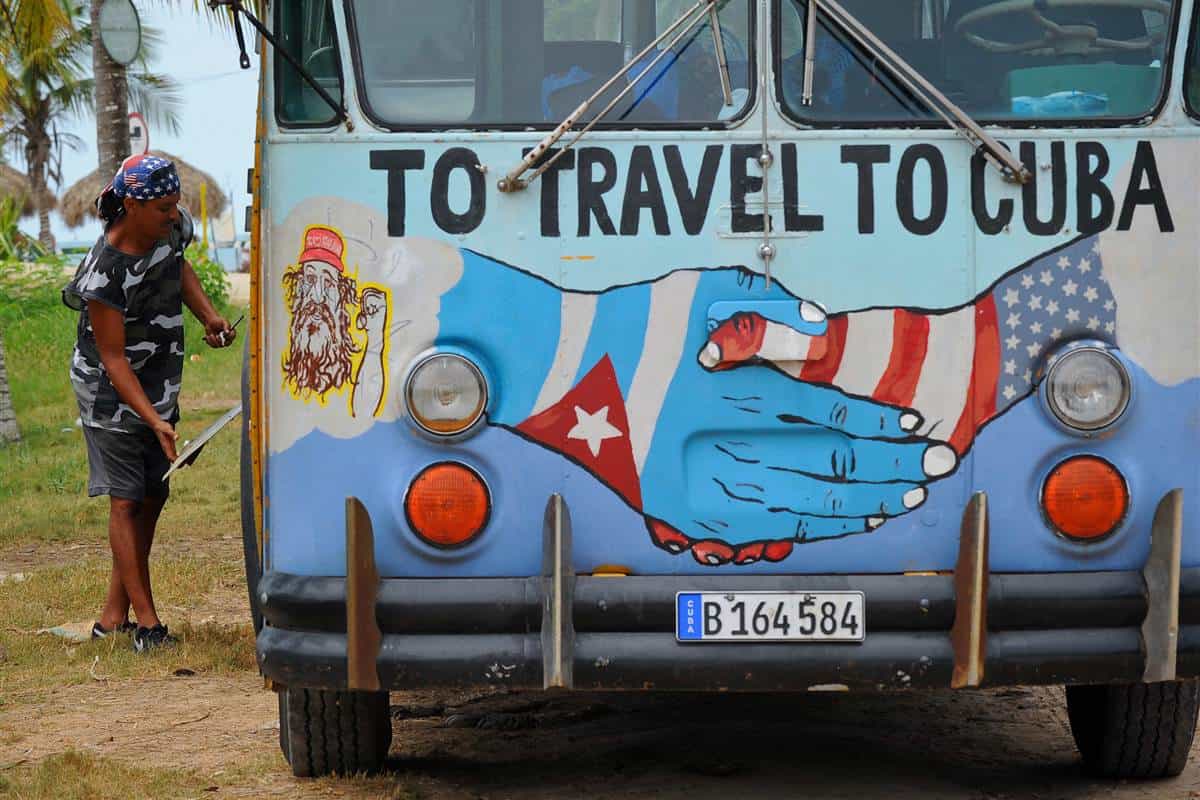
Beyond the Ban: A Guide to Americans Visiting Cuba in 2024.

Sand Fleas and Mosquitoes in Cuba: The Survival Guide (2024)
Other stories, is cuba safe don’t underestimate these 8 safety risks (2024), support for the cuban people: the complete guide for us travelers (2023).
- Search Search Search …
- Search Search …

All about the US ESTA and CUBA [ESTA After Visiting Cuba]
Many visitors to the USA travel there on the ESTA Visa Waiver program. However, a change by the US Government on 12 th January 2021 means that if you have visited Cuba since then you may no longer use the ESTA Visa Waiver Scheme. This article goes through the details of the changes, relevant dates, and what you’ll need to do if you (as an ESTA user) want to visit the United States. I’ll also cover the most frequently asked questions about the US ESTA and Cuba. Here’s our guide to the USA ESTA after visiting Cuba.
THIS POST MAY CONTAIN COMPENSATED AND AFFILIATE LINKS. MORE INFORMATION IN OUR DISCLAIMER
There’s a lot of detail in this article, and I’ve answered a lot of questions in it, so it’s best to read it in its entirety and then if you have questions afterward, either send an email or ask in the comments. It can seem complex at first glance, but the rules are pretty simple now.
Why is the USA ESTA Visa Waiver Scheme relevant to visiting Cuba?
Citizens of 41 countries around the world can use the United States ESTA Visa Waiver scheme to visit the US for business or pleasure. It involves completing an online form, paying a fee, and (if granted) removing the need to apply (in person) for a US Visa at an embassy or consulate.
However, on 12 th January 2021, The United States Government added Cuba as a country to the list of State Sponsors of Terrorisms. That meant that visitors to Cuba were no longer able to visit the USA using the ESTA Visa Waiver Scheme. It does NOT mean that you cannot visit the USA. It simply means that to visit the USA after a trip to Cuba you’ll need to apply for a regular visa, at an embassy or consulate of the United States.
The enforcement of this policy came in October 2022, and since then if you plan to visit the United States after visiting Cuba, then, even if you have an existing ESTA it will be invalidated. You are not eligible for an ESTA if you’ve been to Cuba.
The ESTA Application was updated on 6 July 2023 to include specific questions about travel to Cuba. Previously it had simply referenced “the list of State Sponsors of Terrorism”. The other countries on this list are Iran, North Korea and Syria.
Why the US ESTA cancellation is an issue for long-haul visitors to Cuba
Aside from the issue that you now need a visa to enter the United States, there’s another issue with ESTAs being canceled upon your visit to Cuba.
If you’re visiting Cuba from Europe, Australia, or New Zealand, then it’s highly likely that you may be flying via the United States. That means you likely want to fly home via the United States.
There’s no “in transit” in the United States
The United States does NOT have the concept of “in transit” for connecting flights. You must, even if you’re just getting off one plane and getting onto another, go through immigration and “enter” the United States, before then leaving again to get on your next flight. There’s more from the DHS here.
And if you’re relying on an ESTA to get you through this immigration process then you CANNOT. If you’ve flown into Cuba via the United States, then it’s likely that you’ll be stopped in the USA and told that your ESTA will be canceled if you continue with your onward trip to Cuba and that you will not be allowed to fly back via the United States.
If you want to visit the USA again after Cuba, you’ll need a full visa
If you plan to visit the USA after your trip to Cuba (or indeed if you’ve been there since 12 January 2021), then you will need to go through the full visa application process. This generally means getting an appointment at your local US Embassy or Consulate and obtaining a full US visitor’s visa (B1/B2), which is both expensive and time-consuming.
Am I trying to put you off visiting Cuba?
I just want to clear up, with this article, a lot of misinformation and ensure that you do not get stuck, or book flights via the USA that you will be unable to take.

Does visiting Cuba mean that I won’t be able to get a visa for the United States?
Not at all. If you’re ineligible for an ESTA, then the US Department of Homeland Security states that it does NOT mean that you’re ineligible for a regular visa.
Practical Steps to Take on Visiting Cuba
Here are several practical steps to take that can help you with regard to the ESTA after visiting the United States.
Make sure you don’t try and fly home via the United States
You’ll want to start by making sure that your return flight is NOT via anywhere in the United States unless you already have a regular B1 /B2 Visa for the United States.
The Cuban Government, since October 2022, is NOT stamping passports, unless you specifically ask them to, so there will be nothing in your passport to state that you’ve been to Cuba. However, lying to the American Government – aka making a false declaration to US Immigration Services can have serious consequences for your future travel, and not just to the United States. It’s just not worth it.
Apply for a US Visitors Visa
If you plan to visit the United States for business or pleasure, or if you’re a regular visitor, then you can apply for a 10-year visa. You can get a B1 Visa (which is mainly for business) or a B2 Visa which covers you for both business and pleasure. These are generally valid for 10 years. The time taken to process these visas will differ depending on your embassy, so you’ll want to allow plenty of time.
Investigate a USA Transit Visa If you Want to Fly Long Haul home via the USA
Thanks to Alan Crocker of Australian Travel Agency PleaseYourselfTravel who contacted us at Cuba’s Best and made us aware of the US Transit Visa. Also known as a “C” visa, it can be used for transiting the USA. Wait times at US embassies tend to be shorter for this type of visa, compared to the B1 or B2 visa.
Now what I don’t know is if this visa can be used to transit the USA after visiting Cuba. I’d recommend that you ask your local US embassy. And let us know what you hear, it could help other long-haul visitors to Cuba.
Keep your fingers crossed for change from the US Government
I’m a big believer in the phrase “Hope is not a strategy”, but perhaps a little hope would help here. The current US administration recently announced that visa processing will resume in the Havana Embassy “soon”, which is a good sign that there is always hope that Cuba could be removed from the State Sponsored Terrorism list.
Frequently Asked Questions about the US ESTA and Cuba
Here are just some of the most frequently asked questions about traveling to Cuba and the impact it has on ESTAs.
Can I get a different passport and then apply for an ESTA after visiting Cuba?
The question on the ESTA Visa Waiver Form is “Have you traveled to Cuba”? A different passport makes no difference to this answer. A different passport makes no difference at all to your eligibility for the ESTA Visa Waiver Scheme.
If I fly into Cuba visa the USA and they don’t tell me about this can I fly back?
No. Without a valid visa for the United States, you will be unable to board a plane out of Cuba going to the United States. Even if your flight is a transit flight. There’s no concept of “in transit” in the United States, so you have to go through immigration.
How long does it take to get a B1 or B2 Visa for the United States?
You’ll need to check timeframes with your local embassy as times differ depending on the country, time of year, and staffing.
If I traveled to Cuba before 2021 can I still travel to the USA on an ESTA?
Yes. The cut-off date is 12 January 2021, if you traveled to Cuba AFTER this date, then you are ineligible for the ESTA Visa Waiver scheme.
If I’ve already got an ESTA and go to Cuba what happens?
The Department of Homeland Security states “If an ESTA has already been approved and it is later determined that the traveler has been present in Cuba or holds dual nationality with both a VWP country and Cuba, the ESTA will be revoked. Ineligibility for an ESTA is not a bar to travel to the United States.”
Does Cuba Stamp Passports?
No. Cuba does not stamp passports, it’s the Cuban Tourist Card ( which I wrote about here ) that’s stamped. However, a passport stamp, whether it’s there or not, is irrelevant to the situation with an ESTA.
ESSENTIAL TIPS FOR EXPLORING CUBA INDEPENDENTLY
These are the resources and booking sites that we use when traveling to Cuba.
Get a Cuba Travel and Medical Insurance Quote from Visitors Coverage here – Alternatively, Civitatis Insurance is a great option for the required insurance for Cuba. You will need a Cuba Tourist Card to enter Cuba – some airlines include these, if yours doesn’t, buy one from EasyTouristCard – now valid for 90 days. Book your Viazul Bus tickets here Pre-book and prepay shared & private shuttles here Book the best FREE Walking Tours in Cuba Reserve attractions, day trips, and activities in Cuba here Get online in Cuba EASILY with a Cuba eSIM – read about Cuba ESIMS here , or buy a Cuba eSIM here .
Download and install a VPN BEFORE you travel to Cuba > discount coupon here Book Accommodation in Cuba’s Casa Particular here
Final Words on the USA ESTA after Visiting Cuba
This is a difficult but important article to write. After all, Cuba’s Best is all about promoting why you should come to the country! However, the elephant in the room must be addressed, and it’s only fair that you have all the information before traveling to Cuba. If you plan ahead, understand the rules, and manage your travel with them in mind, this is a minor inconvenience, but one you must be aware of. I am in no way suggesting that you do not visit Cuba, but simply that you are aware of the situation and are therefore able to plan around it.
Cuba’s Best is a participant in the Amazon Services LLC Associates Program, an affiliate advertising program designed to provide a means for sites to earn advertising fees by advertising and linking to amazon.com, amazon.co.uk, amazon.ca. Amazon and the Amazon logo are trademarks of Amazon.com, Inc. or its affiliates .
Sarah Carter
Leave a comment cancel reply.
Your email address will not be published. Required fields are marked *
Save my name, email, and website in this browser for the next time I comment.
2 thoughts on “ All about the US ESTA and CUBA [ESTA After Visiting Cuba] ”
- 2 Comments
Hi Sarah, thank you for this information. Would it be possible for you please to send me the Viazul timetable for February, 2024? Thank you in advance
Hi Derek, I’ll send it to you now, but be aware its all changing. Prices are going up as of March 1 and there’s no online availability for March onwards at this time. Sarah p.s. I’ll send updates once the new timetable is out too.
Privacy Overview
Winter is here! Check out the winter wonderlands at these 5 amazing winter destinations in Montana
- Travel Destinations
Where To Get A Cuban Entry Permit
Published: October 30, 2023
Modified: December 28, 2023
by Mirella Bergeron
- Plan Your Trip
Introduction
Welcome to the mystical and vibrant island of Cuba! With its rich history, colorful culture, and stunning landscapes, it’s no wonder that more and more travelers are setting their sights on this Caribbean gem. However, before you can embark on your Cuban adventure, it’s important to understand the process of obtaining a Cuban entry permit. Whether you’re planning a leisurely vacation or a business trip, this article will guide you through the various ways to acquire a Cuban entry permit.
A Cuban entry permit, also known as a tourist visa, is a requirement for most foreign visitors entering Cuba. It grants you permission to enter and stay in the country for a specified period of time, typically up to 30 days. The Cuban entry permit is an official document that must be obtained prior to travel, and failure to obtain one may result in denial of entry at the Cuban border.
The process of obtaining a Cuban entry permit may seem daunting at first, but fear not! In this article, we will explore several options that you can consider to obtain your Cuban entry permit. Whether you prefer to handle the process independently or seek the assistance of a travel agency, there is a method that suits your needs.
Understanding Cuban Entry Permit
Before diving into the various methods of obtaining a Cuban entry permit, it’s important to have a clear understanding of what it is and why it’s necessary. A Cuban entry permit, also known as a tourist visa, is a document issued by the Cuban government that allows foreign visitors to enter and temporarily stay in Cuba.
The Cuban entry permit is typically valid for a period of 30 days, although extensions may be granted for an additional 30 days, depending on the purpose of your visit. It is important to note that the Cuban entry permit is not a substitute for a passport. You will still need a valid passport to enter Cuba, and your entry permit will be affixed to a page in your passport upon arrival.
One of the most common misconceptions about the Cuban entry permit is that it can only be obtained through a Cuban embassy or consulate. While this is certainly one way to acquire the permit, there are other options available, such as applying through a travel agency or even obtaining it upon arrival in Cuba.
It’s also worth mentioning that the Cuban entry permit is different from a Cuban visa. A Cuban visa is required for visitors coming to Cuba for purposes other than tourism, such as business, education, or journalism. If you are unsure whether you need a Cuban entry permit or a visa, it is recommended to consult with the Cuban embassy or consulate in your country of residence.
Now that you have a clear understanding of what a Cuban entry permit is and why it is necessary, let’s explore the different methods of obtaining one. Whether you prefer to plan ahead and apply through a travel agency or take a more spontaneous approach by obtaining it upon arrival, there is a method that will suit your travel needs.
Applying for a Cuban Tourist Visa
If you are looking to obtain a Cuban entry permit prior to your trip, one of the most common methods is to apply for a Cuban tourist visa. This can be done through a Cuban embassy or consulate in your home country or through a travel agency that specializes in Cuban travel.
When applying for a Cuban tourist visa, you will typically need to submit certain documents, including a completed application form, a valid passport with at least six months of validity, proof of travel insurance, and a return ticket. Additionally, you may be required to provide proof of accommodation or a letter of invitation from a Cuban host if you are staying with a local.
It is important to note that the requirements and application process may vary depending on your country of residence. It is recommended to check with the Cuban embassy or consulate in your home country for specific instructions and requirements.
Once you have gathered all the required documents, you can either submit your application in person or through mail, depending on the instructions provided by the Cuban embassy or consulate. It is advisable to apply well in advance of your planned travel dates, as visa processing times can vary.
Applying for a Cuban tourist visa through a travel agency is another convenient option. Many travel agencies specialize in Cuban travel and can assist you in obtaining your Cuban entry permit. They will guide you through the application process, help you gather the necessary documents, and submit the application on your behalf.
One of the advantages of applying for a Cuban tourist visa through a travel agency is that they are well-versed in the application process and can provide guidance and support along the way. They can also save you time and effort by handling the administrative tasks involved in obtaining the visa.
Whether you choose to apply for a Cuban tourist visa through a Cuban embassy or consulate, or through a travel agency, it is important to start the process well in advance to ensure that you have your entry permit before your travel date. By planning ahead and meeting the requirements, you can smoothly obtain your Cuban entry permit and embark on your Cuban adventure with peace of mind.
Obtaining a Cuban Entry Permit through a Travel Agency
If you prefer a hassle-free approach to obtaining your Cuban entry permit, enlisting the services of a travel agency can be a convenient and efficient option. Many travel agencies specialize in Cuban travel and can assist you in obtaining your entry permit.
When choosing a travel agency, it’s important to select a reputable and reliable agency that has experience in handling Cuban entry permits. Research online reviews and recommendations to ensure you are working with a trustworthy agency. Additionally, consider agencies that have a good understanding of Cuban regulations and can provide you with the necessary guidance throughout the process.
Working with a travel agency has several benefits. First, they will have a good understanding of the application process and requirements, making it easier for you to gather the necessary documents. They will guide you through each step of the process, ensuring that you provide all the required information and meet any specific criteria set by the Cuban government.
Another advantage of using a travel agency is that they typically have established relationships with the Cuban authorities, which can expedite the processing of your entry permit. They have firsthand knowledge of the required paperwork and can help you navigate through any potential obstacles that may arise during the application process.
To begin the process, you will need to provide the travel agency with all the necessary information, such as your personal details, travel dates, and any specific requirements or accommodations you have. They will then guide you through the required paperwork and assist you with filling out the application forms.
Once your application is complete, the travel agency will submit it on your behalf to the Cuban authorities. They will keep you updated on the status of your application and handle any additional documentation that may be required. This saves you time, energy, and potentially reduces the stress associated with the application process.
Once your Cuban entry permit is approved, the travel agency will either send it to you via mail or provide you with the necessary documents to pick it up in person. Be sure to review the permit carefully, making sure all the information is correct, and keep it in a safe place along with your passport.
Obtaining your Cuban entry permit through a travel agency can be a seamless and stress-free process. By entrusting your application to experienced professionals, you can focus on planning the rest of your trip and have peace of mind knowing that your entry permit is in good hands.
Getting a Cuban Entry Permit through a Cuban Embassy or Consulate
Another common method of obtaining a Cuban entry permit is by applying directly through a Cuban embassy or consulate in your home country. This option is ideal for those who prefer to handle the application process independently and have direct communication with Cuban officials.
To get started, you will need to locate the nearest Cuban embassy or consulate in your country. Visit their website or contact them directly to gather information about the application process, required documents, and any specific guidelines or fees.
Typically, when applying for a Cuban entry permit through a Cuban embassy or consulate, you will need to complete an application form, which can often be downloaded from their website. Provide accurate and up-to-date information, including your personal details, travel dates, and purpose of your trip.
In addition to the application form, you will generally be required to submit other supporting documents, such as a valid passport with at least six months of validity, proof of travel insurance, a return ticket, and proof of accommodation in Cuba. Some embassies or consulates may also request a letter of invitation from a Cuban host if you plan to stay with a local.
Once you have gathered all the necessary documents, you can either submit your application in person at the embassy or consulate or send it through certified mail. Be sure to follow the instructions provided by the embassy or consulate to ensure a smooth process.
After submitting your application, it may take several business days for the embassy or consulate to process your request. Keep in mind that processing times can vary, so it is advisable to apply well in advance of your planned travel dates.
If your application is approved, the embassy or consulate will affix the Cuban entry permit onto a page in your passport. Review the permit carefully upon receipt to ensure all the information is correct. In some cases, you may be requested to pick up your passport and permit in person, while in other cases, it may be mailed back to you.
If your application is denied, the embassy or consulate will provide you with reasons for the denial. It is advisable to review the requirements again, correct any issues, and reapply if necessary.
Obtaining a Cuban entry permit through a Cuban embassy or consulate requires careful attention to detail and adherence to the requirements set forth by the Cuban government. By following the instructions provided and submitting all the necessary documents, you can successfully obtain your entry permit and prepare for your journey to Cuba.
Applying for a Cuban Entry Permit Online
With advancing technology, applying for a Cuban entry permit online has become a convenient and popular option for many travelers. This method allows you to complete the application process from the comfort of your own home and eliminates the need to visit a Cuban embassy or consulate in person.
To apply for a Cuban entry permit online, you will need to find a reputable and authorized website that provides online visa services for Cuba. These websites are typically affiliated with the Cuban government and have been authorized to process entry permits on their behalf.
Once you have identified a reliable website, you will need to create an account and provide the necessary information, such as your personal details, travel dates, and purpose of your visit to Cuba. It is important to provide accurate and up-to-date information to avoid any complications during the application process.
After completing the application form, you will be required to upload scanned copies or digital versions of the supporting documents, such as your passport, proof of travel insurance, return ticket, and proof of accommodation in Cuba. Make sure that the scanned copies are clear and legible.
Once you have submitted your application and uploaded all the required documents, you will need to pay the processing fee using a valid debit or credit card. The fee may vary depending on the website and the type of service you choose, so make sure to check the payment details before proceeding.
After submitting your application and payment, the online visa service will process your request and verify your documents. This may take several business days, so it is important to apply well in advance of your planned travel dates to allow for any potential delays.
If your application is approved, you will receive a digital copy of your Cuban entry permit via email. You will need to print out this document and carry it with you during your trip to Cuba. It is essential to keep it safe and present it to the immigration officers upon arrival in Cuba.
Applying for a Cuban entry permit online offers convenience and flexibility, allowing you to complete the process from anywhere in the world. It is important to ensure that you choose a reliable and authorized website to avoid scams or fraudulent activities. By following the instructions and providing the required documents, you can easily obtain your Cuban entry permit and prepare for your Cuban adventure.
Obtaining a Cuban Entry Permit upon Arrival in Cuba
If you haven’t had the opportunity to obtain a Cuban entry permit prior to your trip, don’t worry! It is possible to obtain one upon arrival in Cuba. This option is particularly beneficial for those who have last-minute travel plans or prefer to handle the entry permit process upon reaching their destination.
When you arrive in Cuba, you will need to proceed through immigration control. At the immigration counter, you will be required to present your valid passport along with other necessary travel documents.
Upon reviewing your passport, the immigration officer will provide you with a Cuban entry permit. This permit, also known as a tourist card, will be attached to a page in your passport. It is important to keep this permit safe and secure, as you will need it for validation during your stay in Cuba and upon departure from the country.
In order to obtain the Cuban entry permit upon arrival, it is important to ensure that you meet the requirements set by the Cuban government. This typically includes having a valid passport with at least six months of validity remaining, a return or onward ticket, proof of travel insurance, and sufficient funds to cover your stay in Cuba.
It is important to note that the availability of obtaining a Cuban entry permit upon arrival can vary depending on your nationality and the type of travel. Some countries have agreements with Cuba that allow their citizens to obtain the permit upon arrival, while others may require you to obtain the permit prior to travel.
If you are unsure whether you can obtain the entry permit upon arrival or if you want to avoid any potential complications, it is recommended to apply for the entry permit in advance through a Cuban embassy or consulate or via an authorized online visa service to ensure a smooth and hassle-free entry into Cuba.
Obtaining a Cuban entry permit upon arrival provides flexibility and convenience for travelers who have not been able to obtain one in advance. By meeting the necessary requirements and presenting the required documents to the immigration officers, you can quickly obtain your entry permit and proceed to enjoy the wonders of Cuba.
Obtaining a Cuban entry permit is an essential step for most travelers planning to visit this captivating Caribbean island. Whether you choose to apply for the permit through a travel agency, a Cuban embassy or consulate, online, or opt to obtain it upon arrival, there are options available to suit your preferences and travel needs.
Applying for a Cuban entry permit through a travel agency offers convenience and expert guidance throughout the application process. Their knowledge and experience can alleviate the stress of gathering the required documents and ensure a smooth and efficient process.
For those who prefer to handle the application independently, applying through a Cuban embassy or consulate in your country is a viable option. By following the instructions provided and providing accurate information, you can obtain your entry permit from the official Cuban authorities.
Applying for a Cuban entry permit online grants you the flexibility to complete the process from anywhere in the world. With authorized websites, you can submit your application, upload the required documents, and make the payment conveniently online.
In the event that you haven’t obtained a Cuban entry permit before your trip, obtaining one upon arrival in Cuba is possible in certain circumstances. Ensure that you meet the requirements set by the Cuban government and have the necessary documents to secure your entry permit at the immigration checkpoint.
Regardless of the method you choose to obtain your Cuban entry permit, it’s important to plan ahead and ensure all the required documents are in order. By doing so, you can avoid any last-minute complications and enjoy a seamless entry into the vibrant and captivating island of Cuba.
Remember to always check with official sources such as Cuban embassies or consulates, authorized travel agencies, or reliable online visa services for the most up-to-date information and requirements regarding the Cuban entry permit process.
Now that you have a thorough understanding of the various methods available, you can confidently and efficiently obtain your Cuban entry permit and embark on an unforgettable journey through the rich history, vibrant culture, and breathtaking landscapes of Cuba.

- Privacy Overview
- Strictly Necessary Cookies
This website uses cookies so that we can provide you with the best user experience possible. Cookie information is stored in your browser and performs functions such as recognising you when you return to our website and helping our team to understand which sections of the website you find most interesting and useful.
Strictly Necessary Cookie should be enabled at all times so that we can save your preferences for cookie settings.
If you disable this cookie, we will not be able to save your preferences. This means that every time you visit this website you will need to enable or disable cookies again.
Cookies on GOV.UK
We use some essential cookies to make this website work.
We’d like to set additional cookies to understand how you use GOV.UK, remember your settings and improve government services.
We also use cookies set by other sites to help us deliver content from their services.
You have accepted additional cookies. You can change your cookie settings at any time.
You have rejected additional cookies. You can change your cookie settings at any time.
- Passports, travel and living abroad
- Travel abroad
- Foreign travel advice
Entry requirements
This advice reflects the UK government’s understanding of current rules for people travelling on a full ‘British citizen’ passport from the UK, for the most common types of travel.
The authorities in Cuba set and enforce entry rules. If you’re not sure how these requirements apply to you, contact the Cuban Embassy in the UK .
COVID-19 rules
There are no COVID-19 testing or vaccination requirements for travellers entering Cuba.
Passport validity requirements
To enter Cuba, your passport must have an ‘expiry date’ at least 6 months after the date you arrive and 3 months after your planned departure date.
Check with your travel provider that your passport and other travel documents meet requirements. Renew your passport if you need to.
You will be denied entry if you do not have a valid travel document or try to use a passport that has been reported lost or stolen.
Visa requirements
If you’re visiting Cuba as a tourist, you need to get a tourist card before you travel. Apply through the Cuban Embassy in the UK or check with your travel agent or tour operator.
You must also show proof of onward or return travel. See Cuba’s consular services information for details.
For more information and advice about other types of visas, contact the Cuban Embassy in the UK .
Overstaying your visa
The authorities take any breach of immigration rules seriously. You could be detained if you overstay your visa.
Checks at border control
You must complete the arrival form on the D’Viajeros traveller information portal at least 72 hours before you arrive. You’ll get a QR code to show to the authorities on arrival.
Travelling from the USA to Cuba
Under US law, you are not allowed to travel directly from the USA to Cuba for tourism.
There are 12 reasons or categories for which the USA authorities will approve direct travel from the USA to Cuba. For more information see the US Department of the Treasury website , the US State Department’s travel advice for Cuba and the Code of Federal Regulations .
Travelling from Cuba to the USA
You cannot travel from Cuba to the USA without a US visa.
Vaccine requirements
You must have a certificate to prove you’ve had a yellow fever vaccination if you’re coming from a country listed as a transmission risk .
For full details about medical entry requirements and recommended vaccinations, see TravelHealthPro’s Cuba guide .
Customs rules
There are strict rules about goods you can take into and out of Cuba . You must declare anything that may be prohibited or subject to tax or duty.
Art and antiques
Some art and antiques require an export permit from the Country Heritage Office (‘Bienes Culturales’). Ask the vendor if they have the required permit for the item you are buying. At the airport, you may need to show the receipt.
Photography equipment
You may need an import licence for photography equipment, as well as the appropriate journalism visa.
You are not allowed to bring drones into Cuba. They will be confiscated on arrival and not returned until your departure. The process for getting your drone back could be lengthy.
You cannot take meat products, milk, fresh fruit, vegetables, seeds or organic matter into Cuba, with some exceptions .
Electrical items and GPS on mobiles
Some electrical items with heavy power consumption may be confiscated on entry to Cuba.
Global Positioning Systems ( GPS ) are subject to import requirements. Mobile phones, tablets and laptops can be taken to Cuba, but you must turn off any inbuilt GPS .
Complete a customs form if items are confiscated on your arrival so you can collect them on your departure date.
Taking money into Cuba
The Cuban national peso (CUP – ‘moneda nacional’) is the official currency and cannot be exchanged outside of Cuba. Declare foreign currency you’re taking into Cuba if the value is more than 5,000 US dollars.
You must only exchange money at the Cadeca exchange houses. It is illegal to exchange money anywhere else. See Money .
Related content
Is this page useful.
- Yes this page is useful
- No this page is not useful
Help us improve GOV.UK
Don’t include personal or financial information like your National Insurance number or credit card details.
To help us improve GOV.UK, we’d like to know more about your visit today. We’ll send you a link to a feedback form. It will take only 2 minutes to fill in. Don’t worry we won’t send you spam or share your email address with anyone.
- Skip to main content
- Skip to "About this site"
Language selection
Search travel.gc.ca.
Help us to improve our website. Take our survey !
COVID-19: travel health notice for all travellers
Cuba travel advice
Latest updates: The Need help? section was updated.
Last updated: March 25, 2024 10:25 ET
On this page
Safety and security, entry and exit requirements, laws and culture, natural disasters and climate, cuba - exercise a high degree of caution.
Exercise a high degree of caution in Cuba due to shortages of basic necessities including food, medicine and fuel.
Resort areas - Take normal security precautions
- Cayo Largo del Sur
- Cayo Santa Maria
Guardalavaca
Back to top
Petty crime
Petty crime, such as pickpocketing and purse snatching, occurs.
Theft generally occurs in crowded places such as:
- tourist areas
- public buses
- night clubs
It can also occur in isolated areas.
Theft from hotel rooms, particularly in private accommodations ( casas particulares ), and from cars is common.
- Ensure that your personal belongings, including your passport and other travel documents, are secure at all times
- Don’t pack valuables in your checked luggage
- Avoid showing signs of affluence
- Keep electronic devices out of sight
- Carry valid identification at all times
- Keep a digital and a hard copy of your ID and travel documents
- Avoid carrying large amounts of cash
- Never leave belongings unattended in a vehicle, even in the trunk
Violent crime
Incidents of violent crime are not frequent, but assaults may occur. They mainly occur during a burglary or robbery.
- Stay in accommodations with good security
- Keep your windows and doors locked at all times
- If threatened by robbers, don't resist
Credit card and ATM fraud may occur.
Be cautious when using debit or credit cards:
- pay careful attention when your cards are being handled by others
- use ATMs located in well-lit public areas or inside a bank or business
- avoid using card readers with an irregular or unusual feature
- cover the keypad with one hand when entering your PIN
- check for any unauthorized transactions on your account statements
Some businesses may try to charge exorbitant prices, namely taxis and classic car rentals. Disputes about overcharging may lead to violence.
- Always confirm prices before consuming or taking up a service
- Avoid running a tab
- Avoid leaving your credit card with bar or restaurant staff
- Check your bill to make sure it’s exact
Some hustlers specialize in defrauding tourists. Most of them speak some English or French and go out of their way to appear friendly. They may offer to serve as tour guides or to facilitate the purchase of cigars. Some have used violence in their efforts to steal tourists.
Fraudulent tour agents and taxi drivers also operate throughout the country, including at Havana’s international airport. Thefts of luggage from taxi trunks have occurred.
In bars, sex workers, including minors, may be very persistent and intrusive with tourists who refuse their advances. Foreigners, including Canadians, have been the victim of theft after engaging in sexual relations, and some of them have faced child sex accusations.
- Use reputable tour operators and registered taxis only
- Avoid independent street vendors
- Be wary of strangers who seem too friendly
Overseas fraud
Cuba faces chronic and severe shortages of basic necessities, including:
- bottled water
- public water supply
- hard-currency
Fuel shortages are currently critical and affect a wide range of services. Travelling across the island is extremely challenging. Public transportation services, including taxis, are often disrupted, leaving tourists with few options to travel. Some travellers have been temporarily stranded with a rental car. Intermittent shortages of tap water provided by municipalities happen, including in Havana and in resorts.
Hotels and resorts, that often use generators during power outages, may not be able to maintain their services. Fuel shortages may also affect government services.
Local authorities enforce the rationing of food and medications, which could also affect travellers.
Shortages may lead to disruptions to other essential services. There are often long line-ups at gas stations that have led to altercations.
- Plan accordingly
- Bring some basic necessities with you such as toiletries and medication
- Keep a supply of water, food and fuel on hand
- Make sure you always have access to a complete emergency kit
Power outages
Power outages occur regularly outside of Havana and touristic areas.
Obtaining services during an outage is challenging.
Women’s safety
Women travelling alone may be subject to some forms of sexual harassment
Incidents of sexual assault against Canadian women have occurred, including at beach resorts.
If you’re the victim of a sexual assault, you should report it immediately to the nearest Canadian consulate or embassy and seek medical assistance. You should also report the incident to Cuban authorities and ensure that local police provide you with a Comprobante de Denuncia. This document confirms that a report has been filed.
A criminal investigation will likely not be possible if no formal complaint is made to Cuban authorities before you depart the country.
Police officers may speak only Spanish.
Advice for women travellers
Spiked food and drinks
Snacks, beverages, gum and cigarettes may contain drugs that could put you at risk of sexual assault and robbery.
- Be wary of accepting these items from new acquaintances
- Never leave food or drinks unattended or in the care of strangers
Telecommunications
The telecommunications network in Cuba is poor. Connections are unreliable and may be intermittent.
Some Canadian cell phones may not work, even in large cities. Internet access is limited across the island.
Local authorities control telecommunications. They may block access to mobile phone and Internet in case of civil unrest or before demonstrations.
- Don’t rely on your mobile phone for emergencies, especially outside major cities
- Subscribe to and install a VPN service before leaving Canada
- Avoid travelling alone
- Inform a family member or friend of your itinerary
Online transactions
Online banking or shopping may be challenging in Cuba, if at all possible. Most Cuban websites are unsecure. Many are inaccessible.
Some travellers, who bought their travel package online on a travel website in Canada, found out on arrival in Cuba that their hotel received no reservation or payment.
- Avoid online shopping
- Check with the hotel if they accept online reservations and payments if you plan to book online
Demonstrations
Demonstrations sometimes occur, even if taking part in them may be illegal. Local authorities will break up political demonstrations or gatherings not sanctioned by the government. They may also block access to the Internet, including social media, without notice.
Even peaceful demonstrations can turn violent at any time. They can also lead to disruptions to traffic, public transportation.
- Don’t participate in demonstrations
- Avoid areas where demonstrations and large gatherings are taking place
- Follow the instructions of local authorities
- Monitor local media for information on ongoing demonstrations
Mass gatherings (large-scale events)
Water activities
Rescue services may not be consistent with international standards. Tidal changes can cause powerful currents, and riptides are common. Not all beaches have lifeguards or warning flags to warn of hazardous conditions.
- Never swim alone or after hours
- Don’t swim outside marked areas
- Monitor weather warnings
- Avoid visiting beaches or coastal areas during periods of severe weather warnings
- Don’t dive into unknown water, as hidden rocks or shallow depths can cause serious injury or death
- Consult residents and tour operators for information on possible hazards and safe swimming areas
Tour operators and diving centres may not adhere to international standards.
If you undertake adventure sports, such as diving:
- choose a reputable company that has insurance
- ensure that your travel insurance covers the recreational activities you choose
- don’t use the equipment if you have any doubts about its safety
Recreational boating
If you are planning to go boating:
- know the navigation rules
- make sure life jackets are available for all passengers
- follow safe practices for all water activities such as jet-skiing, water-skiing or fishing
- don’t overload your boat capacity
- carry a VHF marine radio that will generate your position in case of emergency
- be prepared for emergencies
Water safety abroad
Road safety
Road safety standards are poor throughout the country. Accidents causing fatalities are common.
Road conditions
Road conditions are poor throughout the island, with the exception of the Central Highway, which runs west to east across the country. Driving may be dangerous due to:
- poorly maintained roads
- lack of signage
- Inadequate lighting
- roaming livestock
- horse-drawn carts
- pedestrians
- slow-moving traffic
Most Cuban cars are old and in poor condition. They often lack standard safety equipment. Some cars and most bicycles don’t have functioning lights.
Driving habits
Some drivers don’t respect traffic laws. Many of them, driving an electric vehicle for which licence and registration are not required, are inexperienced and unqualified. Drinking and driving is also common.
If you choose to drive in Cuba:
- do so defensively at all times
- avoid travelling at night
- travel in groups when possible
- never pick up hitchhikers, who have been known to assault drivers
Public transportation
City buses are scarce, overcrowded and poorly maintained. Bus service is not reliable.
Incidents of pickpocketing are frequent.
Tour companies offer good bus service between airports and the all-inclusive resorts. Buses used for organized day trips from hotels are usually in good condition.
Official taxis are generally reliable.
Old-model private vehicles offered as taxis are not equipped with standard safety features. They have no insurance coverage for passengers in case of an accident.
- Use only registered taxis
- Avoid flagging a taxi down on the street
- Never share a taxi with strangers
- Agree on a fare before departure, as taxis are not equipped with meters
The rail network is comprehensive, connecting most of the island, but it’s unreliable and slow. Train service is limited to Cuban nationals only.
Health incidents
The Government of Canada continues to investigate the potential causes of unexplained health incidents reported by some Canadian diplomatic staff and dependents posted to Havana.
There is no evidence that Canadian travellers to Cuba are at risk.
We do not make assessments on the compliance of foreign domestic airlines with international safety standards.
Information about foreign domestic airlines
Every country or territory decides who can enter or exit through its borders. The Government of Canada cannot intervene on your behalf if you do not meet your destination’s entry or exit requirements.
We have obtained the information on this page from the Cuban authorities. It can, however, change at any time.
Verify this information with the Foreign Representatives in Canada .
Entry requirements vary depending on the type of passport you use for travel.
Before you travel, check with your transportation company about passport requirements. Its rules on passport validity may be more stringent than the country’s entry rules.
Regular Canadian passport
Your passport must be valid for the expected duration of your stay in Cuba.
Passport for official travel
Different entry rules may apply.
Official travel
Passport with “X” gender identifier
While the Government of Canada issues passports with an “X” gender identifier, it cannot guarantee your entry or transit through other countries. You might face entry restrictions in countries that do not recognize the “X” gender identifier. Before you leave, check with the closest foreign representative for your destination.
Other travel documents
Different entry rules may apply when travelling with a temporary passport or an emergency travel document. Before you leave, check with the closest foreign representative for your destination.
Useful links
- Foreign Representatives in Canada
- Canadian passports
Tourist visa: required Family visa: required Business visa: required
Tourist card
Canadian tourists travelling to Cuba need a visa, known as tourist card. The tourist card allows you to stay in Cuba for up to 90 days. The tourist card is generally included in holiday packages provided by tour operators or airlines providing direct flights from Canada. If you go to Cuba on your own or transit via another country, you are responsible for obtaining the tourist card from a Cuban government office in Canada. You may also buy it at some airports in Canada and in the United States.
Length of stay
As a Canadian tourist, you may stay in Cuba for up to 6 months.
However, you must obtain an extension of stay if you intend to stay longer than the initial 90-day period allowed by the standard tourist card.
D’Viajeros traveller information portal – Government of Cuba
Arrival form
You must provide information on your arrival in Cuba via an online form within 72 hours before entering the country.
Once done, you will receive a QR code by email.
You must show an electronic or printed version of the QR code to authorities upon arrival.
Health insurance
You must show proof of valid health insurance to enter Cuba.
All health insurance policies are recognized in Cuba, except those issued by U.S. insurance companies. However, the Cuban immigration authorities will decide which proof of health insurance is acceptable.
Proof of health insurance may be:
- an insurance policy
- an insurance certificate
- a Canadian provincial health insurance card
If you don’t have proof of health insurance or if the proof you present doesn’t satisfy the Cuban immigration authorities, you may have to obtain health insurance from a Cuban insurance company upon arrival. This insurance may have limited coverage. Local authorities may refuse your entry to the country.
Canadian provincial health care coverage provides very limited coverage outside Canada. It won’t pay for medical bills up-front. It does not include air evacuation, and neither does Cuban health insurance.
Cuban authorities won’t let you leave the country with outstanding medical bills, which are payable by credit card only. You will need to remain in Cuba until all debts are paid.
- Make sure you purchase the best health insurance you can afford
- Ensure the insurance includes medical evacuation and hospital stays
More on Travel insurance
Other entry requirements
Customs officials will ask you to show them:
- a return or onward ticket
- proof of sufficient funds to cover your stay
- proof that you have a place to stay if arriving with “air only” tickets
Dual citizenship
If you’re both a Canadian and Cuban citizen, you must:
- present your valid Cuban passport to the immigration authorities to enter Cuba
- have a valid Canadian passport to return to Canada
If you were born in Cuba, you should contact a Cuban government office in Canada before you leave to ensure compliance with Cuban regulations, regardless of your current citizenship. Failure to do so may result in your being refused entry into Cuba or being detained upon entry.
Canadian permanent residents
You will not be able to leave Cuba if you are a Canadian permanent resident and are without a valid permanent resident card. If your card is lost or stolen, you must contact the Canadian Embassy in Havana to obtain a travel document that will allow you to leave the country. This procedure can take up to 10 working days. Once the document is ready, you'll need to make an appointment with the immigration section of the Canadian Embassy in Havana to collect it before returning to Canada.
Permanent resident travel document: How to apply
Health screening
You may be subjected to a medical screening or interrogation by public health authorities when you enter or exit Cuba, or when reporting for domestic flights.
You may be subject to a mandatory quarantine for medical observation for up to 7 days if local authorities believe that:
- you have come in contact with a suspected carrier of one of these viruses
- you’re arriving from a country with a known epidemic
Children and travel
- Travelling with children
Yellow fever
Learn about potential entry requirements related to yellow fever (vaccines section).
Relevant Travel Health Notices
- Global Measles Notice - 13 March, 2024
- Zika virus: Advice for travellers - 31 August, 2023
- COVID-19 and International Travel - 13 March, 2024
This section contains information on possible health risks and restrictions regularly found or ongoing in the destination. Follow this advice to lower your risk of becoming ill while travelling. Not all risks are listed below.
Consult a health care professional or visit a travel health clinic preferably 6 weeks before you travel to get personalized health advice and recommendations.
Routine vaccines
Be sure that your routine vaccinations , as per your province or territory , are up-to-date before travelling, regardless of your destination.
Some of these vaccinations include measles-mumps-rubella (MMR), diphtheria, tetanus, pertussis, polio, varicella (chickenpox), influenza and others.
Pre-travel vaccines and medications
You may be at risk for preventable diseases while travelling in this destination. Talk to a travel health professional about which medications or vaccines may be right for you, based on your destination and itinerary.
Yellow fever is a disease caused by a flavivirus from the bite of an infected mosquito.
Travellers get vaccinated either because it is required to enter a country or because it is recommended for their protection.
- There is no risk of yellow fever in this country.
Country Entry Requirement*
- Proof of vaccination is required if you are coming from or have transited through an airport of a country where yellow fever occurs.
Recommendation
- Vaccination is not recommended.
- Discuss travel plans, activities, and destinations with a health care professional.
- Contact a designated Yellow Fever Vaccination Centre well in advance of your trip to arrange for vaccination.
About Yellow Fever
Yellow Fever Vaccination Centres in Canada * It is important to note that country entry requirements may not reflect your risk of yellow fever at your destination. It is recommended that you contact the nearest diplomatic or consular office of the destination(s) you will be visiting to verify any additional entry requirements.
There is a risk of hepatitis A in this destination. It is a disease of the liver. People can get hepatitis A if they ingest contaminated food or water, eat foods prepared by an infectious person, or if they have close physical contact (such as oral-anal sex) with an infectious person, although casual contact among people does not spread the virus.
Practise safe food and water precautions and wash your hands often. Vaccination is recommended for all travellers to areas where hepatitis A is present.
Measles is a highly contagious viral disease. It can spread quickly from person to person by direct contact and through droplets in the air.
Anyone who is not protected against measles is at risk of being infected with it when travelling internationally.
Regardless of where you are going, talk to a health care professional before travelling to make sure you are fully protected against measles.
Hepatitis B is a risk in every destination. It is a viral liver disease that is easily transmitted from one person to another through exposure to blood and body fluids containing the hepatitis B virus. Travellers who may be exposed to blood or other bodily fluids (e.g., through sexual contact, medical treatment, sharing needles, tattooing, acupuncture or occupational exposure) are at higher risk of getting hepatitis B.
Hepatitis B vaccination is recommended for all travellers. Prevent hepatitis B infection by practicing safe sex, only using new and sterile drug equipment, and only getting tattoos and piercings in settings that follow public health regulations and standards.
The best way to protect yourself from seasonal influenza (flu) is to get vaccinated every year. Get the flu shot at least 2 weeks before travelling.
The flu occurs worldwide.
- In the Northern Hemisphere, the flu season usually runs from November to April.
- In the Southern Hemisphere, the flu season usually runs between April and October.
- In the tropics, there is flu activity year round.
The flu vaccine available in one hemisphere may only offer partial protection against the flu in the other hemisphere.
The flu virus spreads from person to person when they cough or sneeze or by touching objects and surfaces that have been contaminated with the virus. Clean your hands often and wear a mask if you have a fever or respiratory symptoms.
In this destination, rabies is carried by dogs and some wildlife, including bats. Rabies is a deadly disease that spreads to humans primarily through bites or scratches from an infected animal. While travelling, take precautions , including keeping your distance from animals (including free-roaming dogs), and closely supervising children.
If you are bitten or scratched by an animal while travelling, immediately wash the wound with soap and clean water and see a health care professional. Rabies treatment is often available in this destination.
Before travel, discuss rabies vaccination with a health care professional. It may be recommended for travellers who are at high risk of exposure (e.g., occupational risk such as veterinarians and wildlife workers, children, adventure travellers and spelunkers, and others in close contact with animals).
Coronavirus disease (COVID-19) is an infectious viral disease. It can spread from person to person by direct contact and through droplets in the air.
It is recommended that all eligible travellers complete a COVID-19 vaccine series along with any additional recommended doses in Canada before travelling. Evidence shows that vaccines are very effective at preventing severe illness, hospitalization and death from COVID-19. While vaccination provides better protection against serious illness, you may still be at risk of infection from the virus that causes COVID-19. Anyone who has not completed a vaccine series is at increased risk of being infected with the virus that causes COVID-19 and is at greater risk for severe disease when travelling internationally.
Before travelling, verify your destination’s COVID-19 vaccination entry/exit requirements. Regardless of where you are going, talk to a health care professional before travelling to make sure you are adequately protected against COVID-19.
Safe food and water precautions
Many illnesses can be caused by eating food or drinking beverages contaminated by bacteria, parasites, toxins, or viruses, or by swimming or bathing in contaminated water.
- Learn more about food and water precautions to take to avoid getting sick by visiting our eat and drink safely abroad page. Remember: Boil it, cook it, peel it, or leave it!
- Avoid getting water into your eyes, mouth or nose when swimming or participating in activities in freshwater (streams, canals, lakes), particularly after flooding or heavy rain. Water may look clean but could still be polluted or contaminated.
- Avoid inhaling or swallowing water while bathing, showering, or swimming in pools or hot tubs.
Travellers' diarrhea is the most common illness affecting travellers. It is spread from eating or drinking contaminated food or water.
Risk of developing travellers' diarrhea increases when travelling in regions with poor standards of hygiene and sanitation. Practise safe food and water precautions.
The most important treatment for travellers' diarrhea is rehydration (drinking lots of fluids). Carry oral rehydration salts when travelling.
Typhoid is a bacterial infection spread by contaminated food or water. Risk is higher among children, travellers going to rural areas, travellers visiting friends and relatives or those travelling for a long period of time.
Travellers visiting regions with a risk of typhoid, especially those exposed to places with poor sanitation, should speak to a health care professional about vaccination.
Salmonellosis is a common illness among travellers to this country. It can be spread through contaminated food or beverages, such as raw or undercooked poultry and eggs, as well as fruits or vegetables.
Practice safe food and water precautions . This includes only eating food that is properly cooked and still hot when served.
Pregnant women, children under 5 years of age, those over 60 years of age, and those with weakened immune systems are at greater risk of becoming seriously ill.
Most people recover on their own without medical treatment and from proper rehydration (drinking lots of fluids).
- Carry oral rehydration salts when travelling.
Travellers with severe symptoms should consult a health care professional as soon as possible.
Insect bite prevention
Many diseases are spread by the bites of infected insects such as mosquitoes, ticks, fleas or flies. When travelling to areas where infected insects may be present:
- Use insect repellent (bug spray) on exposed skin
- Cover up with light-coloured, loose clothes made of tightly woven materials such as nylon or polyester
- Minimize exposure to insects
- Use mosquito netting when sleeping outdoors or in buildings that are not fully enclosed
To learn more about how you can reduce your risk of infection and disease caused by bites, both at home and abroad, visit our insect bite prevention page.
Find out what types of insects are present where you’re travelling, when they’re most active, and the symptoms of the diseases they spread.
There is a risk of chikungunya in this country. The risk may vary between regions of a country. Chikungunya is a virus spread through the bite of an infected mosquito. Chikungunya can cause a viral disease that typically causes fever and pain in the joints. In some cases, the joint pain can be severe and last for months or years.
Protect yourself from mosquito bites at all times. There is no vaccine available for chikungunya.
- In this country, dengue is a risk to travellers. It is a viral disease spread to humans by mosquito bites.
- Dengue can cause flu-like symptoms. In some cases, it can lead to severe dengue, which can be fatal.
- The level of risk of dengue changes seasonally, and varies from year to year. The level of risk also varies between regions in a country and can depend on the elevation in the region.
- Mosquitoes carrying dengue typically bite during the daytime, particularly around sunrise and sunset.
- Protect yourself from mosquito bites . There is no vaccine or medication that protects against dengue.
Zika virus is a risk in this country.
Zika virus is primarily spread through the bite of an infected mosquito. It can also be sexually transmitted. Zika virus can cause serious birth defects.
During your trip:
- Prevent mosquito bites at all times.
- Use condoms correctly or avoid sexual contact, particularly if you are pregnant.
If you are pregnant or planning a pregnancy, you should discuss the potential risks of travelling to this destination with your health care provider. You may choose to avoid or postpone travel.
For more information, see Zika virus: Pregnant or planning a pregnancy.
Animal precautions
Some infections, such as rabies and influenza, can be shared between humans and animals. Certain types of activities may increase your chance of contact with animals, such as travelling in rural or forested areas, camping, hiking, and visiting wet markets (places where live animals are slaughtered and sold) or caves.
Travellers are cautioned to avoid contact with animals, including dogs, livestock (pigs, cows), monkeys, snakes, rodents, birds, and bats, and to avoid eating undercooked wild game.
Closely supervise children, as they are more likely to come in contact with animals.
Person-to-person infections
Stay home if you’re sick and practise proper cough and sneeze etiquette , which includes coughing or sneezing into a tissue or the bend of your arm, not your hand. Reduce your risk of colds, the flu and other illnesses by:
- washing your hands often
- avoiding or limiting the amount of time spent in closed spaces, crowded places, or at large-scale events (concerts, sporting events, rallies)
- avoiding close physical contact with people who may be showing symptoms of illness
Sexually transmitted infections (STIs) , HIV , and mpox are spread through blood and bodily fluids; use condoms, practise safe sex, and limit your number of sexual partners. Check with your local public health authority pre-travel to determine your eligibility for mpox vaccine.
Medical services and facilities
Good health care is limited in availability.
The health system is government-owned. The Cuban government operates hospitals and clinics throughout the island.
Medical professionals are generally adequately trained. However, facilities are in poor condition. They lack basic drugs, medical supplies and equipment. Hygiene practices may be inadequate.
Medical services are also available at most hotels and international clinics located in resort areas, where doctors and nurses provide initial emergency medical care reserved for foreigners. Health care provided in those clinics is usually better than services offered in public facilities.
Mental health care facilities are extremely limited. There are no hotlines available for this type of care in the country.
Emergency and ambulance services are limited. Response times may be slow, especially outside tourist areas.
Make sure you get travel insurance that includes coverage for medical evacuation and hospital stays.
Travel health and safety
Many prescription medications may not be available in Cuba.
If you take prescription medication, you’re responsible for determining their legality in the country.
- Bring enough of your medication with you
- Always keep your medication in the original container
- Pack your medication in your carry-on luggage
- Carry a paper and an electronic copy of your prescriptions
Cuba faces severe medicine shortages, including antibiotics and common pain killers. In addition of your prescription medication, you should also bring your own basic medicine in sufficient quantities to last beyond the length of your intended stay.
Public health authorities implement insect control measures including periodic fumigation and aerial spraying.
- Consult your doctor before traveling to see if the situation could affect you, especially if you suffer from respiratory ailments
- Stay away from a nearby fumigation process
Death abroad
Standards of mortuary services in Cuba differ from those in Canada. Cultural and religious beliefs are not taken into consideration. Autopsies are mandatory.
There is one funeral home and one morgue in the country which cater to foreigners. Both are located in Havana. Only these facilities have the authorization to issue appropriate documentation to accompany human remains. Timelines for the repatriation of human remains are long and costly.
The capacity for refrigeration is limited, as well as the availability of coffins and urns. Embalming materials and techniques are unlike those in Canada. Embalming may not be an option in some circumstances.
Ensure your insurance includes coverage for the repatriation of human remains.
Death Abroad Factsheet
Keep in Mind...
The decision to travel is the sole responsibility of the traveller. The traveller is also responsible for his or her own personal safety.
Be prepared. Do not expect medical services to be the same as in Canada. Pack a travel health kit , especially if you will be travelling away from major city centres.
You must abide by local laws.
Learn about what you should do and how we can help if you are arrested or detained abroad .
Transfer to a Canadian prison
Canada and Cuba accede the Treaty between the Government of Canada and the Government of the Republic of Cuba on the Serving of Penal Sentences. This enables a Canadian imprisoned in Cuba to request a transfer to a Canadian prison to complete a sentence. The transfer requires the agreement of both Canadian and Cuban authorities. This process can take a long time, and there is no guarantee that the transfer will be approved by either or both sides.
Cuban criminal justice
The criminal justice system in Cuba differs significantly from that in Canada. Charges are not laid until the investigation is complete. If you’re arrested in Cuba, you will likely be detained during the entire period of investigation. You should expect long delays to resolve your case. You will not be allowed to leave the country during this period.
Cuba’s constitution allows the death penalty, but since 2003, the country has effectively had a moratorium on carrying out death sentences.
Investments
Private property rights in Cuba are strictly controlled. Only Cubans and permanent residents can buy a property in Cuba or register a privately owned vehicle. Be wary of strangers or acquaintances offering to purchase these items on your behalf. If you plan on making investments in Cuba, seek legal advice in Canada and Cuba. Do so before making commitments. Related disputes could take time and be costly to resolve.
Penalties for possession, use or trafficking of illegal drugs are severe. Convicted offenders can expect lengthy prison sentences.
- Pack your own luggage and monitor it closely at all times
- Don’t transport other people’s packages, bags or suitcases
Drugs, alcohol and travel
Child sex tourism
It's a serious criminal offence to have sex with minors in Cuba.
Local authorities are actively working to prevent child sex tourism. Tourists, including Canadians, have been convicted of offences related to the corruption of minors aged 16 and under.
Prison sentences for this type of crime range from 7 to 25 years. Release on bail before trial is unlikely.
Child Sex Tourism: It’s a Crime
To get married in Cuba, you must provide several documents including:
- your birth certificate
- a copy of your passport
- your decree absolute certificate if divorced
- a death certificate for your spouse and a marriage certificate if widowed
- an affidavit of your single status if you have never been married before
All documents must be translated into Spanish, certified, authenticated and legalised by the Embassy of Cuba in Canada.
Consult the Embassy of Cuba in Canada if you wish to marry in Cuba, including to a Cuban national.
- Foreign diplomatic missions and consulates in Canada
- Marriage overseas factsheet
Drones are prohibited.
They will be confiscated by the authorities upon entry.
Photography
Professional photographers require a visa to work in Cuba. They may also need a permit to import their equipment.
It’s forbidden to photograph, including with drones:
- military and police installations or personnel
- harbour, rail and airport facilities
Military zones and any other restricted or heavily guarded areas are not always identified.
Identification
Authorities may request to see your ID at any time.
- Keep a photocopy of your passport in case it’s lost or seized
- Keep a digital copy of your ID and travel documents
Dual citizenship is not legally recognized in Cuba.
If local authorities consider you a citizen of Cuba, they may refuse to grant you access to Canadian consular services. This will prevent us from providing you with those services.
Travellers with dual citizenship
International Child Abduction
The Hague Convention on the Civil Aspects of International Child Abduction is an international treaty. It can help parents with the return of children who have been removed to or retained in certain countries in violation of custody rights. It does not apply between Canada and Cuba.
If your child was wrongfully taken to, or is being held in Cuba by an abducting parent:
- act as quickly as you can
- consult a lawyer in Canada and in Cuba to explore all the legal options for the return of your child
- report the situation to the nearest Canadian government office abroad or to the Vulnerable Children’s Consular Unit at Global Affairs Canada by calling the Emergency Watch and Response Centre.
If your child was removed from a country other than Canada, consult a lawyer to determine if The Hague Convention applies.
Be aware that Canadian consular officials cannot interfere in private legal matters or in another country’s judicial affairs.
- International Child Abduction: A Guidebook for Left-Behind Parents
- Canadian embassies and consulates by destination
- Emergency Watch and Response Centre
Imports and exports
Personal effects and medicine.
Tourists are allowed to enter Cuba with personal effects but items entering the country for donations may be subject to import rules. They could be seized and taxed in accordance with local legislation. This includes:
- new or used material goods
- personal care products
- medications
Cuban customs officials have the authority to decide what they deem to be for the tourist's personal use. They may apply steep tariffs for personal baggage exceeding the allowable weight.
You may export:
- up to 20 cigars without documentation
- up to 50 cigars if they are in their original container, closed and sealed with the official hologram
If exceeding these amounts, you must provide a guarantee of origin certificate.
Failure to comply with this regulation will lead to the seizure of the cigars without compensation.
Art objects
Art objects, including artifacts and paintings purchased in Cuba, must be accompanied by an export permit. It’s usually provided by state-owned galleries.
In the absence of such a permit, items must be registered with the Registro Nacional de Bienes Culturales.
Ministry of Culture – Government of Cuba
Electronic devices
Electronic devices with GPS technology may be confiscated upon entry and returned upon departure.
Satellite telephones are forbidden.
Electronic cigarettes and personal vaporizers
You cannot bring electronic cigarettes or personal vaporizers to Cuba.
Customs officials will seize these items upon arrival.
Black market
Street vendors may offer you black-market goods, such as cigars, or ask to change dollars for Cuban currency.
Engaging in black-market transactions is illegal and can lead to difficulties with the Cuban authorities.
Cuban Customs Administration – Government of Cuba
Boat traffic
The U.S. government closely monitors boat traffic in the Straits of Florida. It will seize any vessel not bearing a licence from the Office of Foreign Assets Control (OFAC) if it believes it’s headed for Cuba.
You’re subject to these measures if you dock your Canadian-registered boat in Florida. You’ll be exempted if you are simply en route to Cuba via the U.S.
If travelling by boat to Cuba from the US:
- Make sure to know the regulation related to docking and port controls
- Expect thorough search and interrogations
You should carry an international driving permit.
International Driving Permit
Traffic accidents
Traffic accidents have led to arrest and detentions of Canadians in the past.
Accidents resulting in death or injury are treated as crimes. The onus is on the driver to prove innocence. If you’re found to bear responsibility in a traffic accident resulting in serious injury or death, you may face up to 10 years in prison.
If you’re involved in an accident:
- don’t leave the scene
- don’t move your vehicle
- call the police
While car insurance is mandatory for foreign drivers and foreign-registered vehicles, it's not for Cuban citizens. As a result, most local drivers don't carry a car insurance. You shouldn’t expect compensation for vehicle damage or personal injury from a Cuban driver following a car accident.
Vehicle rentals
Car insurance coverage in Cuba differs from that in Canada.
Rental agencies are government-controlled. If you’re found to be at fault in an accident, the rental agency will nullify your coverage and seek compensation to cover the cost of repairs.
Cuban authorities can prohibit you from leaving the country unless the rental agency receives payment or until all claims associated with an accident are settled.
Contract agreements don’t cover occasional drivers. As a result, the signatory is responsible for all people driving the vehicle.
- Be cautious if you rent a vehicle in Cuba
- Avoid renting a scooter; thieves target them and you may be responsible for the cost of its replacement
- Make sure to obtain a receipt when returning a rental vehicle
The currency of Cuba is the Cuban peso (CUP).
Credit cards issued by U.S. financial institutions or affiliated with U.S. banks are not accepted in Cuba.
Canadian credit cards are increasingly accepted at restaurants and hotels. However, the system is unreliable and bank cards may not work or may stop working without notice.
ATMs are rare and also unreliable. Each withdrawal is limited to 5 000 CUP, when possible.
You may obtain credit card cash advances at banks, hotels or a state-run exchange bureau, but in CUP only.
When travelling to Cuba, you should plan to bring enough currency to cover the duration of your stay. You should also plan for small bank notes to facilitate daily transactions such as, street food, taxis and tips.
You can easily exchange Canadian and American dollars, as well as euros for CUP at:
- the money exchange bureaus in Cuba’s international airports
- major hotels
- official exchange bureaus
It’s illegal to change money on the street or anywhere else other than authorized entities.
You cannot go through Cuban customs with more than 5 000 CUP.
Hurricane season
Hurricanes usually occur from mid-May to the end of November. During this period, even small tropical storms can quickly develop into major hurricanes.
These severe storms can put you at risk and hamper the provision of essential services.
If you decide to travel to a coastal area during the hurricane season:
- know that you expose yourself to serious safety risks
- be prepared to change your travel plans on short notice, including cutting short or cancelling your trip
- stay informed of the latest regional weather forecasts
- carry emergency contact information for your airline or tour operator
- follow the advice and instructions of local authorities
- Tornadoes, cyclones, hurricanes, typhoons and monsoons
- Large-scale emergencies abroad
- Active storm tracking and hurricane watches and warnings - United States’ National Hurricane Center
Rainy season
The rainy season extends from April to October.
Seasonal flooding can hamper overland travel and reduce the delivery of essential services. Roads may become impassable due to mudslides and landslides. Bridges, buildings, and infrastructure may be damaged.
Earthquakes
Cuba is located in an active seismic zone.
Earthquakes may occur. Even minor earthquakes can cause significant damage.
In the event of an earthquake:
- monitor local media to stay informed of the evolving situation
- follow the instructions of local authorities, including evacuation orders
- Earthquakes – What to Do?
- Latest earthquakes - U.S. Geological Survey
Local services
In case of emergency, dial:
- police: 106
- medical assistance: 104
- firefighters: 105
Consular assistance
For emergency consular assistance, call the Embassy of Canada to Cuba, in Havana, and follow the instructions. At any time, you may also contact the Emergency Watch and Response Centre in Ottawa.
The decision to travel is your choice and you are responsible for your personal safety abroad. We take the safety and security of Canadians abroad very seriously and provide credible and timely information in our Travel Advice to enable you to make well-informed decisions regarding your travel abroad.
The content on this page is provided for information only. While we make every effort to give you correct information, it is provided on an "as is" basis without warranty of any kind, expressed or implied. The Government of Canada does not assume responsibility and will not be liable for any damages in connection to the information provided.
If you need consular assistance while abroad, we will make every effort to help you. However, there may be constraints that will limit the ability of the Government of Canada to provide services.
Learn more about consular services .
Risk Levels
take normal security precautions.
Take similar precautions to those you would take in Canada.
Exercise a high degree of caution
There are certain safety and security concerns or the situation could change quickly. Be very cautious at all times, monitor local media and follow the instructions of local authorities.
IMPORTANT: The two levels below are official Government of Canada Travel Advisories and are issued when the safety and security of Canadians travelling or living in the country or region may be at risk.
Avoid non-essential travel
Your safety and security could be at risk. You should think about your need to travel to this country, territory or region based on family or business requirements, knowledge of or familiarity with the region, and other factors. If you are already there, think about whether you really need to be there. If you do not need to be there, you should think about leaving.
Avoid all travel
You should not travel to this country, territory or region. Your personal safety and security are at great risk. If you are already there, you should think about leaving if it is safe to do so.
Cultural News and Events

Cuba Tourist Board of Canada
- REQUIREMENTS FOR CANADIANS PASSENGERS TRAVELING TO CUBA (updated as of Nov 2, 2023)
- Travelling from Canada to Cuba, you just need a valid Canadian passport, if your passport is from another country, you need your Canadian resident card or a work or study permit that includes a multiple-entry permit attached to your passport. For Cuba, you need the tourist card (the tourist card is included in your plane ticket and is issued by the airline on board)
- All passengers arriving to Cuba from a direct flight from Canada, do not need to present a vaccination passport.
- Medical insurance is required for Cuba, medical insurance must cover any type of medical emergency including COVID-19, so in case of a medical emergency the tourist is responsible for paying the costs, for this reason, Cuba suggests having medical insurance for all types of medical emergencies including covid. If you are unable to obtain insurance in Canada, you can purchase medical insurance in Cuba at the airport or visit www.cubatravel.cu. For more information on what the insurance includes, contact the representative at the Insurance desk at the airport in Cuba.
- Since January 1, 2022, travelers must complete the customs and health declaration form, this is done online and the website to visit is: https://www.dviajeros.mitrans.gob.cu . All travelers must complete this information online 48 hours before traveling to Cuba. Once the form is completed, you will receive a QR code by email. You must show an electronic or printed version of the QR code to the authorities upon arrival. If you have any problems and you can't fill out the form online because you don't have internet access, the printed form will be available on arrival at the airport in Cuba to fill it out.
- CURRENCY: The local currency is the Cuban Peso (CUP). The convertible peso has been discontinued and is no longer accepted in Cuba. US and CAD dollars are accepted anywhere in Cuba. At tourist areas which includes hotels, restaurants and shopping malls, payment is only accepted with debit/visa cards or visa / mastercard credit cards from Canadian banks . Customers who do not have a credit card can buy a prepaid card in Cuba at the airport or at any money exchange kiosks at hotels . Payments outside the tourist areas are all in Cuban pesos (CUP); We recommend exchanging Canadian dollars for pesos as needed and only if you plan to travel OUTSIDE of tourist areas, since you will not be able to change the remaining pesos into Canadian dollars at the end of the holiday.
For additional information, please contact Cuba Tourist Board at:
E-mail: [email protected] TL : 416 362 0700

View all posts by:
Comments are closed.
Currency Exchange

IMAGES
VIDEO
COMMENTS
For most European citizens, a valid passport is required during your stay in Cuba. Some countries, like Spain, require the passport to be valid for at least 6 months. It's also important to note that if you plan to travel to the United States after visiting Cuba, you'll need a visa. This is because the electronic system for travel authorization ...
Travel to Cuba for tourist activities remains prohibited by statute. However, the Department of Treasury's Office of Foreign Assets Control (OFAC) has issued general licenses for 12 categories of travel. ... To apply for a Cuban visa or for any questions regarding Cuban consular services, please contact the Cuban Embassy in Washington, D.C ...
Purchasing the Tourist Card online ahead of time allows you to skip the lines at the airport (especially important if you have a connecting flight to Cuba). 2. Buy it From Your Airline. Some airlines assist travelers with the purchase of the Tourist Visa for travel to Cuba.
Citizens of some Caribbean, Asian and European countries, including Russia, Montenegro, Serbia and Singapore, can travel visa-free to Cuba for up to 90 days with a passport that doesn't expire for at least six months. Passport holders from all other countries must purchase what is known officially as a Cuba Tourist Card, although it's often ...
2. A Cuban Tourist Visa / Cuban Tourist Card. Everyone visiting Cuba who is not Cuban-born or a permanent resident of Cuba needs to present a Cuban tourist visa upon arrival in the country. Don't worry - getting a Cuban tourist visa, which is also known as a Cuban tourist card, is a straightforward process that you even complete on the day ...
Delta: The Cuban tourist visa from Delta costs $85 and can be purchased during check-in or at your departure gate. Copa Airlines: The Cuban tourist visa from Copa Airlines costs either $20 or $30, depending on your departure airport. Air Canada: Air Canada is an airline that includes the cost of the Cuba visa in the price of its ticket.
Visit the Embassy of Cuba website for the most current visa information. Cuba requires visitors to have non-U.S. medical insurance, which is usually included in airline ticket prices on flights originating in the United States. ... If you are planning to enter Cuba with a U.S. or foreign-registered aircraft or maritime vessel on temporary ...
Cuba visas are divided based on the purpose of your travel. As such, the most common types of visas for Cuba are: Cuba Tourist Visa (Tourist Card), which is issued to foreign nationals who wish to enter the country for tourism purposes. Cuba Family Visa (A-2), which is issued to foreign nationals who wish to enter Cuba in order to join a family ...
To enter Cuba, all visitors need to present a completed Tourist Card — which serves a similar function to a tourist visa. These are usually available through your airline (ask when booking). Alternatively, you can purchase one through a Cuban travel agency. Costs range from US$50 to US$85, including processing fees.
The required documents when applying for a Cuba Tourist visa include your passport, health insurance, and a valid travel ticket. The Cuba tourist visa is also known as a Cuba Tourist Card. If you are from a Cuba-visa required country, you have to get the tourist card before you travel. You can get the Tourist Card at a Cuban consulate, through ...
From Mexico: If you're flying from Mexico to Cuba then you can buy the green Cuban Tourist Card in Cancun or Mexico City. You can do this near check-in or at the boarding gate. They are typically around $25. From Canada: If you're traveling from Canada, your airline may provide the green Tourist Card with your ticket.
If you apply at a Cuban consulate, the Cuba visa fees tend to range from $20-$75. You must pay either in cash or through bank transfer. However, check the consulate's website to be sure of their required payment method. Private companies which offer Cuba visas will have additional fees for the service, as do airports.
Welcome to the Online Visa Application System of the Republic of Cuba. Please, find the country where you are to fill out your application. Country where you are. Algeria. Angola. Antigua and Barbuda. Argentina. Australia. Austria. Azerbaiyán. Bahamas. Barbados. Belarús. Bélgica.
First, you need to know that anyone wish to come to Cuba as a tourist must have a valid ID number, health insurance and a visa, because the identity card is not enough for the entry. Your passport must be valid for at least six months at the time of entry. If it's not, you can just get a temporary one and enter Cuba with it.
Visitors to Cuba must obtain a visa before travel or a tourist card from one of the Cuban diplomatic missions, ... However, this condition is not mentioned on Timatic, which states that all normal passport holders of Benin can enter Cuba without a visa, for a maximum stay of 90 days. Date of visa changes 19 November 1965 or 28 May 1966 ...
To enter Cuba you will need a valid passport, a 30-day tourist visa, and proof of departure. To enter Cuba you will need a valid passport, a 30-day tourist visa, and proof of departure. Go. Home. Cuba. 1-888-456-3212. MAKE MY ADVENTURE. SMS. SMS USA & Canada. Whatsapp. Facebook Messenger.
If you're wondering whether you'll need a Cuba tourist card or a Cuban visa to enter Cuba, the answer is that both terms are widely used interchangeably to mean the same. But they're actually different. Most people refer to the Cuban tourist card as a Cuban visa, but a Cuban visa is rarely needed. Only a minority of countries (around 25 ...
3. Buy it From Your Country's Cuban Embassy or Consulate. This is the hardest way to buy the Cuba Tourist Visa since you have to go in person with the necessary paperwork. Price varies depending on the embassy, but you can expect to pay between $35 and $75 for the card. 4.
That meant that visitors to Cuba were no longer able to visit the USA using the ESTA Visa Waiver Scheme. It does NOT mean that you cannot visit the USA. It simply means that to visit the USA after a trip to Cuba you'll need to apply for a regular visa, at an embassy or consulate of the United States. The enforcement of this policy came in ...
A Cuban entry permit, also known as a tourist visa, is a document issued by the Cuban government that allows foreign visitors to enter and temporarily stay in Cuba. The Cuban entry permit is typically valid for a period of 30 days, although extensions may be granted for an additional 30 days, depending on the purpose of your visit.
Passport validity requirements. To enter Cuba, your passport must have an 'expiry date' at least 6 months after the date you arrive and 3 months after your planned departure date. Check with ...
Tourist visa: required Family visa: required Business visa: required. Tourist card. Canadian tourists travelling to Cuba need a visa, known as tourist card. The tourist card allows you to stay in Cuba for up to 90 days. ... Tourists are allowed to enter Cuba with personal effects but items entering the country for donations may be subject to ...
At tourist areas which includes hotels, restaurants and shopping malls, payment is only accepted with debit/visa cards or visa / mastercard credit cards from Canadian banks. Customers who do not have a credit card can buy a prepaid card in Cuba at the airport or at any money exchange kiosks at hotels . ... For additional information, please ...